北师大版(2019)高中英语选择性必修第二册 Unit 4 Humour Viewing 知识点讲练课件1(共119张PPT)
文档属性
| 名称 | 北师大版(2019)高中英语选择性必修第二册 Unit 4 Humour Viewing 知识点讲练课件1(共119张PPT) |  | |
| 格式 | ppt | ||
| 文件大小 | 665.0KB | ||
| 资源类型 | 教案 | ||
| 版本资源 | 北师大版(2019) | ||
| 科目 | 英语 | ||
| 更新时间 | 2023-03-16 18:20:57 | ||
图片预览


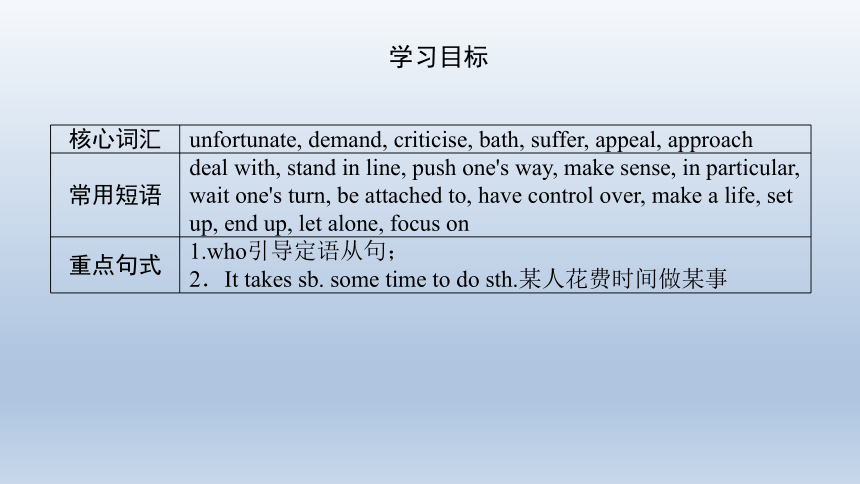
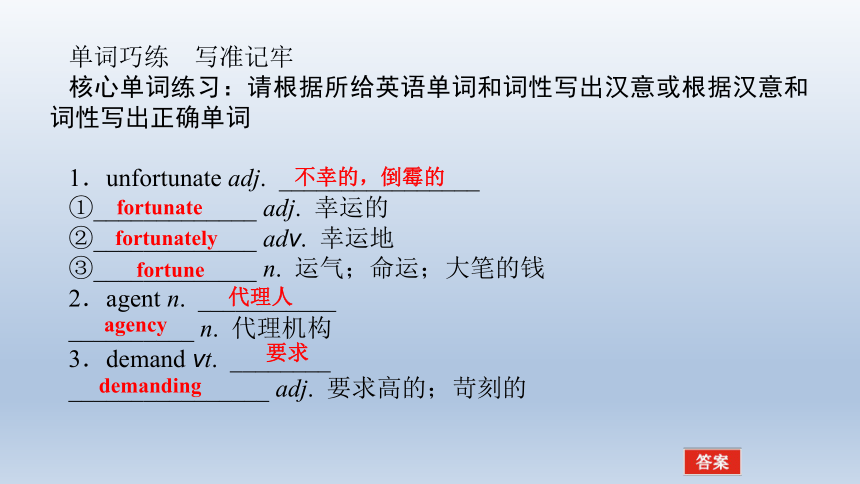
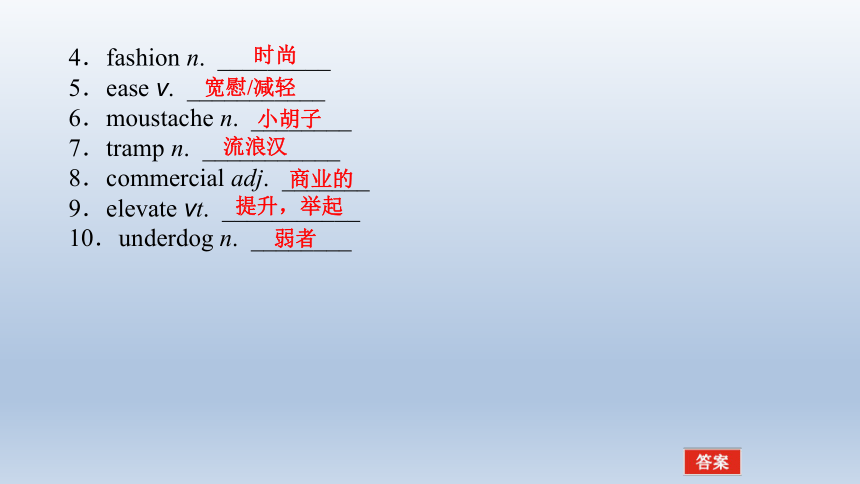

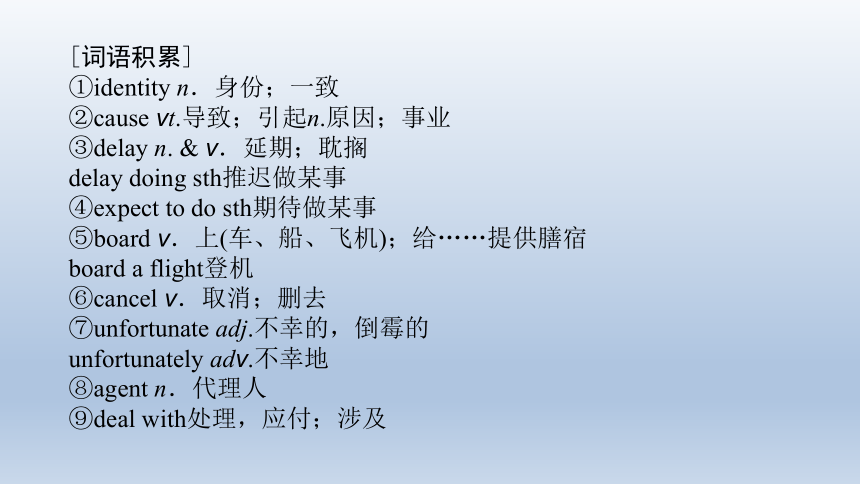

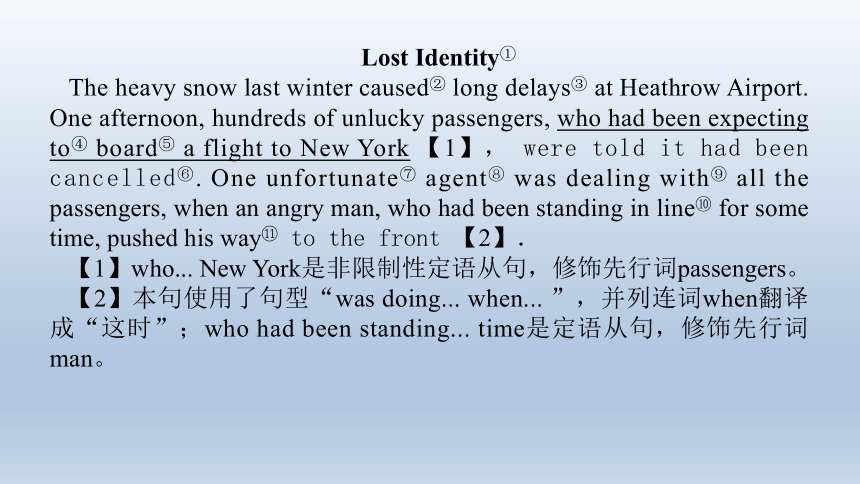
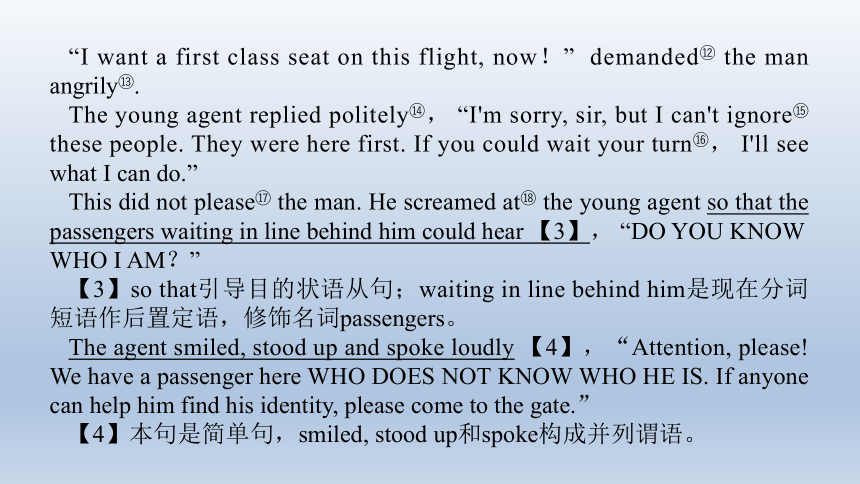
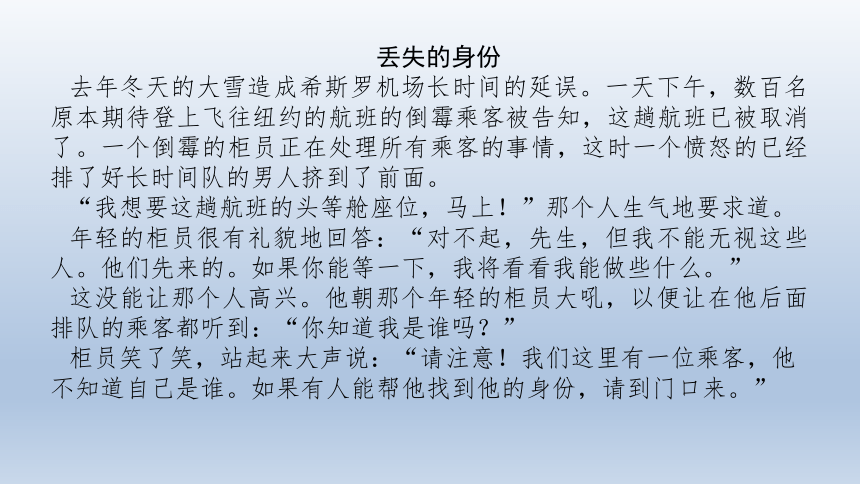
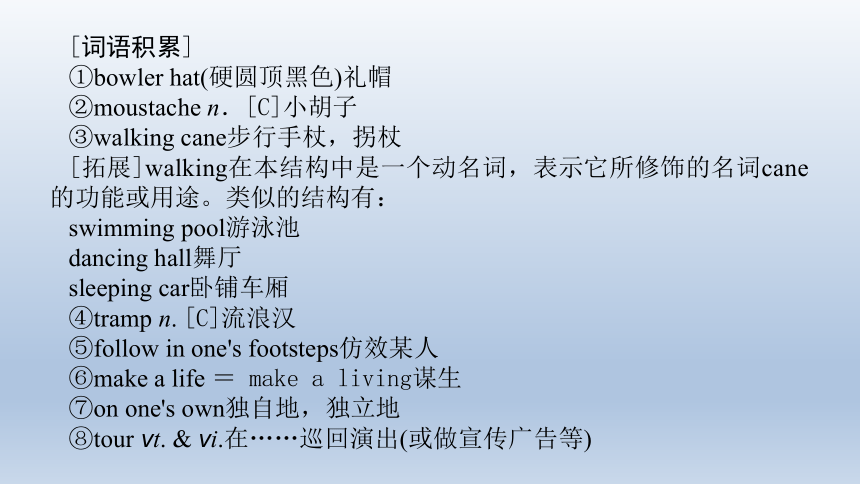
文档简介
(共119张PPT)
Part F Writing Workshop, Viewing Workshop
& Reading Club 1~2
双基夯实·课前排查
学习目标
核心词汇 unfortunate, demand, criticise, bath, suffer, appeal, approach
常用短语 deal with, stand in line, push one's way, make sense, in particular, wait one's turn, be attached to, have control over, make a life, set up, end up, let alone, focus on
重点句式 1.who引导定语从句;
2.It takes sb. some time to do sth.某人花费时间做某事
单词巧练 写准记牢
核心单词练习:请根据所给英语单词和词性写出汉意或根据汉意和词性写出正确单词
1.unfortunate adj. ________________
①_____________ adj. 幸运的
②_____________ adv. 幸运地
③_____________ n. 运气;命运;大笔的钱
2.agent n. ___________
__________ n. 代理机构
3.demand vt. ________
________________ adj. 要求高的;苛刻的
不幸的,倒霉的
fortunate
fortunately
fortune
代理人
agency
要求
demanding
4.fashion n. _________
5.ease v. ___________
6.moustache n. ________
7.tramp n. ___________
8.commercial adj. _______
9.elevate vt. ___________
10.underdog n. ________
时尚
宽慰/减轻
小胡子
流浪汉
商业的
提升,举起
弱者
课前预读·自修自研
[词语积累]
①identity n.身份;一致
②cause vt.导致;引起n.原因;事业
③delay n. & v.延期;耽搁
delay doing sth推迟做某事
④expect to do sth期待做某事
⑤board v.上(车、船、飞机);给……提供膳宿
board a flight登机
⑥cancel v.取消;删去
⑦unfortunate adj.不幸的,倒霉的
unfortunately adv.不幸地
⑧agent n.代理人
⑨deal with处理,应付;涉及
⑩stand in line站队,排队
push one's way挤过去
demand vt.要求
angrily adv.生气地
angry adj.生气的
politely adv.有礼貌地
polite adj.有礼貌的
ignore vt.忽视;不理睬
wait one's turn等待轮到某人
please v.使高兴;使满意
pleased adj.高兴的;满意的
pleasing adj.令人愉快的;合意的
scream at sb朝某人尖声喊叫
Lost Identity①
The heavy snow last winter caused② long delays③ at Heathrow Airport. One afternoon, hundreds of unlucky passengers, who had been expecting to④ board⑤ a flight to New York 【1】, were told it had been cancelled⑥. One unfortunate⑦ agent⑧ was dealing with⑨ all the passengers, when an angry man, who had been standing in line⑩ for some time, pushed his way to the front 【2】.
【1】who... New York是非限制性定语从句,修饰先行词passengers。
【2】本句使用了句型“was doing... when... ”,并列连词when翻译成“这时”;who had been standing... time是定语从句,修饰先行词man。
“I want a first class seat on this flight, now!” demanded the man angrily .
The young agent replied politely , “I'm sorry, sir, but I can't ignore these people. They were here first. If you could wait your turn , I'll see what I can do.”
This did not please the man. He screamed at the young agent so that the passengers waiting in line behind him could hear 【3】, “DO YOU KNOW WHO I AM?”
【3】so that引导目的状语从句;waiting in line behind him是现在分词短语作后置定语,修饰名词passengers。
The agent smiled, stood up and spoke loudly 【4】,“Attention, please! We have a passenger here WHO DOES NOT KNOW WHO HE IS. If anyone can help him find his identity, please come to the gate.”
【4】本句是简单句,smiled, stood up和spoke构成并列谓语。
丢失的身份
去年冬天的大雪造成希斯罗机场长时间的延误。一天下午,数百名原本期待登上飞往纽约的航班的倒霉乘客被告知,这趟航班已被取消了。一个倒霉的柜员正在处理所有乘客的事情,这时一个愤怒的已经排了好长时间队的男人挤到了前面。
“我想要这趟航班的头等舱座位,马上!”那个人生气地要求道。
年轻的柜员很有礼貌地回答:“对不起,先生,但我不能无视这些人。他们先来的。如果你能等一下,我将看看我能做些什么。”
这没能让那个人高兴。他朝那个年轻的柜员大吼,以便让在他后面排队的乘客都听到:“你知道我是谁吗?”
柜员笑了笑,站起来大声说:“请注意!我们这里有一位乘客,他不知道自己是谁。如果有人能帮他找到他的身份,请到门口来。”
[词语积累]
①bowler hat(硬圆顶黑色)礼帽
②moustache n.[C]小胡子
③walking cane步行手杖,拐杖
[拓展]walking在本结构中是一个动名词,表示它所修饰的名词cane的功能或用途。类似的结构有:
swimming pool游泳池
dancing hall舞厅
sleeping car卧铺车厢
④tramp n. [C]流浪汉
⑤follow in one's footsteps仿效某人
⑥make a life = make a living谋生
⑦on one's own独自地,独立地
⑧tour vt. & vi.在……巡回演出(或做宣传广告等)
⑨commercial adj.以获利为目的的;商业的;商业化的n. [C](电台或电视播放的)广告
⑩fall over oneself to do sth.特别卖力/迫不及待做某事
have/take control over sth./sb.控制、掌控某物/某人
set up创建,建立,开办
box office n. [C]票房,售票处
hit n.[C](唱片、电影或戏剧的)成功
Modern Times(《摩登时代》)是查理·卓别林(Charles Chaplin)导演并主演的一部经典喜剧电影,于1936年2月25日上映。本片故事发生在美国20世纪30年代经济萧条时期,工人查理(卓别林饰)在工厂日复一日发疯般工作,最终进入精神病院,这一切都与当时的经济危机给人们带来的生存危机有着密切的联系。在艰难的生活中,查理和一个孤女相濡以沫,场面温馨感人,散发着人性的光辉。《摩登时代》被认为是美国电影史上最伟大的电影之一,也是查理·卓别林最著名的作品之一。
mental torment精神折磨
torment n.[U,C](尤指精神上的)折磨,痛苦;苦难之源
go to jail进监狱(强调动作)
[拓展]be in jail坐牢(强调状态)
aside from = apart from除……以外
shine a light on揭示,阐明
exploitation n.[U]剥削;开发,开采;利用[拓展]exploit vt.剥削;开发,开采
B
Imagine a bowler hat①, a moustache② and a walking cane③. This is probably all it takes to make an image of Charlie Chaplin as the “Little Tramp④”, one of the most famous comedy characters in the world 【1】.
【1】画线部分中“it takes to make an image... in the world”是省略了关系代词that的定语从句,修饰先行词all;该从句中it是形式主语,真正的主语是不定式短语“to make an image... in the world”;“one of... in the world”作“the ‘Little Tramp’”的同位语。
Charles Spencer Chaplin was born in London on 16 April, 1889. Both his father and mother were successful actors and singers, so it was natural for him to follow in their footsteps⑤. However, his father died when Chaplin was just 10 years old, and his mother then became sick. Suddenly, Charlie and his elder brother had to make a life⑥ on their own⑦. Chaplin joined a youth stage group. He then began working in stage shows and toured⑧ the US in 1910. The audiences loved him, and in 1912, he was offered a movie contract. His early films were such huge commercial⑨ successes that film companies were falling over themselves to⑩ hire him 【2】.
【2】画线部分中包含such...that结构,意为“如此……以至于……”,在本句中引导结果状语从句。注意,such后接名词(短语)。
In order to have greater control over his work, Chaplin set up his own studio—United Artists—in Hollywood in 1917. Chaplin wrote, directed, starred in and edited all his own films, producing a series of box office hits . His most successful one is probably the silent film Modern Times in 1936. In the film, Chaplin's Little Tramp character works in a factory, suffers mental torment , goes to jail , but finally becomes a hero. Aside from the physical comedy, the film shines a light on the exploitation of workers on production lines.
想象一顶黑色圆顶礼帽,一撮小胡子和一根手杖。这可能就是查理·卓别林作为世界上最著名的喜剧角色之一的“小流浪汉”的形象所需要的一切。
查理·斯宾塞·卓别林,1889年4月16日出生于伦敦。他的父母都是成功的演员和歌手,所以他追随他们的脚步是很自然的。然而,他的父亲在卓别林仅10岁时就去世了,随后他的母亲也病倒了。突然,查理和哥哥不得不靠他们自己谋生。卓别林加入了一个青年剧团。之后,他开始从事舞台表演工作,并于1910年在美国巡回演出。观众都很喜欢他。1912年,他接到了一份电影合约。他早期的电影获利丰厚,电影公司争相聘请他。
为了对自己的作品有更大的控制权,卓别林于1917年在好莱坞成立了自己的工作室——联美影业公司。卓别林自编自导自演并亲自剪辑了自己所有的电影,制作了一系列票房大卖的电影。他最成功的一部可能是1936年的无声电影《摩登时代》。在电影中,卓别林饰演的小流浪汉在一家工厂工作,遭受精神折磨,进了监狱,但最终成了英雄。除了是肢体喜剧外,这部电影还揭示了对(工厂)流水线工人的剥削。
卓别林的电影把滑稽喜剧提高到了新的水平。他的电影以精心设计的场景著称。卓别林(电影)的一些场景要花费几天时间来规划设计。这就是卓别林追求完美的方式。他的一部分天才之处在于,让笑话看起来毫不费力。
卓别林的电影绝不仅仅是一系列松散拼凑在一起的滑稽场面。他把弱者的处境——饥饿、贫穷、懒惰——拍成了黄金喜剧。在1950年的一次采访中,卓别林说:“我听过对幽默最好的定义是,幽默让人陷入或摆脱困境……我对大多数事情都很情绪化,但对我的工作却很客观。我不是从工作中得到满足;我得到宽慰。”卓别林扮演了需要克服困难的普通人,并确保角色最终总是散发出玫瑰的香味。
卓别林有时被批过于多愁善感,但今天的喜剧演员仍然认为他的电影对自己的表演方式深有影响。卓别林会说这些话吗?眉毛一扬,面无表情,举起圆顶礼帽——有时一帧画面胜过万语千言。
[词语积累]
①go out of fashion过时的,不流行的
[拓展]be in fashion流行,时髦
come into fashion时兴起来
fashion design时装设计
fashion show时装秀
②in particular = particularly尤其,特别
③core n. [C]核心,要点
④characteristic n. [C]特征
⑤reserved adj.内向的,矜持的
⑥to a certain degree = to some degree在某种程度上
⑦frustration n.[C, usually, pl.]令人懊丧(或懊恼、沮丧)的事物;[U]挫败;懊恼
⑧sense of humour幽默感
[拓展]sense of responsibility责任感
sense of duty责任感
⑨ease vt.& vi.(使)宽慰,减轻,缓解n.[U]容易,轻易;舒适,安逸
[拓展]with ease容易地,轻而易举地
at one's ease自由自在,无拘无束
put sb. at (their) ease使自在,使不受拘束
⑩presentation n. [C](口头)发言,说明,展示会; [U]提交,出示
build relationships建立关系
relax moods放松心情
develop friendships发展友谊
make sense易于理解;有意义,讲得通;合乎情理
be related to与……有关,与……有联系
absurdity n. [U,C]荒谬,荒唐
[拓展]absurd adj.荒谬的,荒唐的
humorously adv.幽默地,滑稽地
[拓展] humorous adj.有幽默感的,滑稽有趣的
humor n. [U]幽默,幽默感
well off adj.富有的,富裕的;境况良好
do the splits做劈叉
be dependent on依靠,依赖
文化采风
The similarities and differences between Chinese humour and British humour
Chinese humour is based on puns and the British use irony, sarcasm (讽刺), banter (玩笑), understatement, self deprecation, teasing or mockery.
British and Chinese humour uses irony and sarcasm, however, for different purposes. In China, the speaker and the listener are aware that the speaker is making fun of something and the speaker is trying to make the listener happy. Humour is usually used as a form of positive communication. The British can sound mean when they sense that the listener is not aware of the situation.
Another similarity is the use of irony. The British use more irony in their everyday language. The target of British irony and sarcasm is usually themselves.
Chinese humour avoids joking about someone's personal life as it's taboo. British humour has no limits.
C
If you stopped any person on the street and asked them to name a British comedian, chances are you would find that they could 【1】! British comedy is popular and well liked all over the world. From actors such as Charlie Chaplin, who was famous during the silent age of filmmaking to Rowan Atkinson who plays Mr Bean on TV and in films, British comedy has never gone out of fashion① 【2】. And while there are many popular dramatic actors in Britain, there is something extra special about British comedy and comedians for global audiences. The reasons for the success and popularity of British comedy in particular②, are interesting to explore.
【1】画线部分中的系动词are后面是一个省略了引导词that的表语从句;find后是that引导的宾语从句。注意,在规范英语中,that引导主语从句、表语从句和同位语从句时,一般不可省略。此外,为了避免重复,句中情态动词could的后面省略了name a British comedian。
【2】画线部分的主干是“British comedy has never gone out of fashion”;“From... to...”是介词短语,to后省略了actors such as;这个介词短语中含有两个who引导的定语从句,第一个定语从句“who was famous... filmmaking”修饰先行词Charlie Chaplin,第二个定语从句“who plays Mr Bean on TV and in films”修饰先行词Rowan Atkinson。
Humour is a part of every culture but it could be said that it is one of the core③ characteristics④ of British culture. Most non British people see the British as being very reserved⑤, polite and formal and while that is true to a certain degree⑥, British people love to express themselves through humour too. Humour can act as a way for more reserved people to express their frustrations⑦ with life, daily routines and even other people!
British people expect everyone to have a sense of humour⑧ and it's very much a part of daily life. You will often find passengers getting on buses joking with drivers, doctors making light hearted jokes to ease⑨ their patients' worries and business people making jokes in presentations⑩ to get their audiences' attention. Humour helps to build relationships , relax moods and develop friendships . So now that we have established how important humour is to British people, what exactly makes them laugh And does British humour make sense to other cultures
Jokes are often related to culture. One example would be the British class system. There have been many popular comedy TV programmes which have explored the absurdity of people with less money and status attempting to copy the lifestyles of the wealthy and others which humorously explore life for the less well off . It would be difficult perhaps, for non British people who don't know the culture to fully understand that kind of humour 【3】.
【3】画线部分中的It是形式主语,不定式短语“to fully... humour”是真正的主语;介词for后的“non British people who don't know the culture”是不定式的逻辑主语,其中含有一个who引导的定语从句。
Another area that might be difficult for foreigners to get when it comes to British comedy is “word play” 【4】.British comedy often involves words that have two meanings, or words that sound the same but have different meanings. There are lots of these in English so British people really enjoy this kind of humour. For example, here is a classic joke from a comedian of the 1960s, Tommy Cooper:
【4】画线部分的主干是“Another area is ‘word play’”,其中“that might...British comedy”是定语从句,修饰先行词area,该定语从句中还含有一个固定用法when it comes to...“当涉及……时”。
如果你在街上拦住任何一个人,让他们说出一位英国喜剧演员的名字,你很可能会发现他们真的能说出来!英国喜剧在全世界都大受欢迎和喜爱。从无声电影时代著名演员查理·卓别林到在电视、电影中扮演憨豆先生的罗温·艾金森,英国喜剧从未过时。尽管英国有很多受欢迎的戏剧演员,但英国的喜剧和喜剧演员对于全球观众来说还是有一些特别之处的。尤其是英国喜剧的成功和流行的原因,探索起来非常有趣。
幽默是每一种文化的组成部分,但它可以说是英国文化的核心特征之一。大多数非英国人认为英国人非常矜持、儒雅和庄重,虽然在一定程度上确实如此,但英国人也喜欢通过幽默来表达自己。幽默可以作为较内向的人表达对生活、日常事务甚至其他人的不满的一种方式!
英国人希望每个人都有幽默感,这是日常生活中非常重要的一部分。你会经常发现乘客在公交车上与司机开玩笑,医生讲轻松的笑话来缓解病人的担忧,商人在演讲中说笑话来吸引听众的注意力。幽默有助于建立人际关系、放松情绪和发展友谊。所以既然我们已经证实了幽默对英国人的重要性,那么到底是什么让他们发笑呢?其他文化能够理解英式幽默吗?
笑话往往与文化有关。英国的阶级制度就是一个例子。有很多受欢迎的喜剧电视节目探讨了钱少地位低的人试图模仿有钱人生活方式的荒谬,还有另一些幽默地为不太富裕的人探索生活的节目。对不懂这种文化的非英国人来说也许会很难充分理解这种幽默。
外国人对英国喜剧还有一个比较难理解的地方就是涉及”文字游戏”时。英国喜剧经常包含有两种含义的词,或者听起来发音相同但含义不同的词。英语中有很多这样的笑话,所以英国人真的很喜欢这种幽默。例如,20世纪60年代喜剧演员汤米·库伯的经典笑话:我对健身教练说:“你能教我劈叉吗?”他说:“你有多灵活?”我说:“我周二不行。”
或者这一个:
病人:“医生,医生,请帮帮我!我越来越矮了。”
医生:“就在那儿等着,耐心点。”
这两个笑话(的笑点)都取决于词的双重含义,“flexible”(可以很好地移动你的身体,或者有弹性的时间安排)和“patient”(愿意等的人,或者病人)。
有时候,不只是词有两种含义,还有表达方式。以这个笑话为例:
昨晚睡得很沉……在壁炉里醒来。
“To sleep like a log”是英语中的一个习语,意思是睡得很沉,似乎像木头一样坚硬、一动不动。这个笑话用在烧木头的“壁炉里醒来”把“slept like a log”按字面意思理解了。无论你是否觉得这类笑话有趣,这都是你个人的事;但事实是这些笑话很容易被说英语的各个年龄层的人理解,这就意味着它是英国喜剧非常重要的组成部分。
英国喜剧还有两个独有的特点,一是用其他文化中被认为是“禁忌”的话题开玩笑,二是自嘲式幽默。例如,一个“禁忌”的话题可能是政治和政客,这是英国人喜欢用来开玩笑的事情。人们可能会温和地嘲笑那些身居高位的人:“我老板连放洗澡水都不会,更别提经营这家公司了!”或者嘲笑自己,例如:“我在进行新的‘海鲜’减肥法。如果我看到食物,张口就吃!”也许最广受青睐的英式幽默的类型是罗温·艾金森、查理·卓别林等人用视觉和身体表现的喜剧。他们在最简单、最日常的情境中发现幽默,而观看时我们往往会感到恐惧、尴尬和喜悦交织在一起!
当然,对一个人来说有趣的事对另一个人来说可能并不有趣。一个人可能会因为一个笑话而轻轻地咯咯笑,而另一个人可能会捧腹大笑。但英国喜剧演员和喜剧作家使用了广泛的技巧,从讽刺到双关再到自嘲,这意味着每个人都能在喜剧中找到适合自己的口味。尽管儒雅的英国人讲笑话的方式意味着有时甚至很难分辨那是不是个笑话!
语篇细研·教材精读
Ⅰ.课文结构图示(A篇)
Ⅱ.课文预习自测(Lost Identity)
1.What can we know about the agent according to the passage
A.He had to deal with all the passengers because of long delays.
B.He was angry with passengers and screamed at them.
C.He didn't want to please the angry passenger.
D.He wanted to find out who the angry passenger was.
A
2.Why did the man say “DO YOU KNOW WHO I AM”?
A.He wanted to persuade the agent to give him the money.
B.He wanted to get the agent to realize he was a VIP.
C.He had waited in line for ages.
D.He had important things to do.
B
3.What will the story be when it is going on
A.The man will be angry and fight with the agent.
B.The man will feel ashamed and go to wait in line.
C.The man will be arrested.
D.The man will be helped by the police.
B
4.In what tone did the writer write the article
A.Serious. B.Cautious.
C.Humorous. D.Indifferent.
C
核心突破·要点讲解
第一版块:重点单词
1.demand vt.强烈要求;需要 n.需求;要求
(教材P18)“I want a first class seat on this flight, now!” demanded the man angrily.“我想要这趟航班的头等舱座位,马上!”那个人生气地要求道。
(1)demand sth. of /from sb. 向某人要求某物
demand to do sth. 要求做某事
demand that...(should) do... 要求……做……
(2)in (great) demand 需求大
satisfy/meet one's demands 满足某人的需求
on demand 一经需求
make demands on.../that sb. (should) do... 对……提出要求
The illegal businessman demanded a large amount of rhino horn of him.
那个非法商人向他索要大量的犀牛角。
The president demands to enhance the reputation of our company by improving the quality of the products.
=The president demands (that) we (should) enhance the reputation of our company by improving the quality of the products.
董事长要求通过提高产品质量来提高我们公司的声誉。
The coach demanded an increase in the intensity of the exercise.
教练要求增加运动强度。
It was an unusually hot summer and air conditioners were in great demand.
那年夏天异常热,空调需求量很大。
Satisfying/Meeting all his demands makes no sense, which will only make him more greedy.满足他所有的要求毫无意义,只会使他更加贪婪。
[即学即练] 单句语法填空/完成句子
①The professor came in and demanded ________ (tell) what had happened.
②The company refused the workers' demand that their wages ________ _______(raise).
③The Harry Potter books are quite popular. They are ________ great demand in this city.
④The mayor demanded that the hero _____________ (save) at the expense of everything.
⑤His father insists that any investment involves an element of risk. He demands ___________ (归还) the money.
to be told
(should)be
raised
in
(should) be saved
to be returned
⑥It is demanded that the creations of the participants ____________________ (应该上交) before the end of this week.
⑦Here he demanded that gas ______________ (运用) instead of coal.
⑧At that time, there was an outbreak of cholera; doctors and nurses were ______________ (需求大).
⑨The company says it is unable to __________________________ (满足工人们的要求) for higher wages.
⑩____________________ (据要求) a mirror should be fixed in every room of the building.
(should) be submitted
(should) be used
in great demand
satisfy/meet the workers' demands
It is demanded that
词语积累:
demanding adj.要求高的,苛刻的
I do think he has the potential to finish the demanding work ahead of schedule.
我确实认为他有潜力提前完成这项艰巨的工作。
学法点拨:
(1)当表示“请求,要求”的demand,require,request等词或其名词形式后接名词性从句时,从句均应使用虚拟语气,即谓语用“should+动词原形”,should可以省略。
(2)demand不构成demand sb. to do sth.,类似的还有动词hope,agree。
He demanded me to leave.(×)
He demanded that I (should) leave.(√)
他要求我离开。
He made the demand that I (should) change the way I communicated with my daughter, for what I said only made her defensive.
他要求我改变和我女儿交流的方式,因为我说的话只会激起她的自我防御。
2.criticise vi.&vt. 批评,指责
(教材P21)Chaplin is sometimes criticised for being overly sentimental, but...卓别林有时因过于伤感而受到批评,但……
critic n. 批评家;评论家
critical adj. 批判的;挑剔的;极重要的,关键的
criticism n. 批评;批判;指责
Facing the criticism of the critics, he was at a loss. At the critical moment, his friend helped him out.
面对批评家的批评,他不知所措。在关键时刻,他的朋友帮助了他。
[即学即练] 单句语法填空/完成句子
①Please make every effort to make your parents happy instead of ________ (criticise) and complaining.
②________ (criticise) by his instructor for his academic performance, Tom felt incredibly sad.
③Yesterday, he ____________ by his boss _____ (因……受到批评) raising such a question.
criticising
Criticised
was criticised
for
搭配:
criticise sb. for sth.因某事批评某人
She is constantly criticising her friends for being selfish.
她不断地批评她的朋友们自私。
3.bath n.&v.洗澡
(教材P23)People might gently mock people in positions of power “my boss can't run a bath, let alone this company!”...人们可能会委婉地嘲笑当权者:“我的老板连洗澡水都放不好,更别提管理这个公司了!”……
(1)n.浴室;淋浴
take/have a bath 洗澡
(2)v.给……洗澡
bathe v. 洗澡;使沐浴(在光线里)
I bought a two bath house near the boarding school for the convenience of my son.
为了方便我儿子,我在寄宿学校附近买了一套有两间浴室的房子。
[即学即练] 单句语法填空
①Susannah has ________ long hot bath every evening.
②In the afternoon the sun ________ (bathe) the city in shades of pink and gold.
③The sun began to rise in the sky, ________ (bathe) the mountain in golden light.
④________ (bathe) in the sun in the late afternoon, the building in the hometown of Confucius looks more splendid.
a
bathes
bathing
Bathed
佳句背诵:
①He purely wanted to take a bath at home comfortably.
他只是想在家里舒服地洗个澡。
②Though busy, the professor baths his son every night.
教授虽然很忙,但还是每晚给儿子洗澡。
4.board v.上船(或火车,飞机、公共汽车等) n.木板;膳食;董事会
on board 在(船/火车/飞机等)上,上(船/火车/飞机等)
go on board=go aboard 登上(飞机/火车/船等)
climb/come aboard 上船(车等),登机
jump aboard 跳上船(车等)
be aboard 在船(车、飞机等)上
aboard a bus 在公共汽车上,上公共汽车
aboard a plane/a ship/a train 在飞机上,登机/在船上,上船/在火车上,上火车
All aboard! 请大家上船(或飞机、火车、公共汽车等)!
[即学即练] 完成句子
①所有搭乘Trans Link服务的顾客在登机前必须持有有效机票。
All customers travelling on TransLink services must be in possession of a valid ticket before ________ (board).
②当宣布检查员在船上后,看守人的家人就玩了个游戏,看谁能最先注意到这艘船。
After announcing the inspector ____________ the keeper's family made it a game to see who could notice the boat first.
③自2012年3月以来,我已经进行了89次旅行,其中51次是在国外。
Since March 2012, I've done 89 trips—of those, 51 ________________.
boarding
was aboard
have been abroad
aboard prep.&adv.在(船、飞机、火车、公共汽车等)上;上(船、飞机、火车等)
形近:①abroad adv.在国外
所谓“在国外”就是“在广阔的(broad)”环境中。
go abroad去国外
②broad adj.广阔的,宽阔的;广泛的;概括的
知识链接:
英语中有一些表示方位、地点的名词,加前缀a ,变成地点副词,意思仍然与该名词有关,只是词性变化了,表示“在……(名词意义)的位置上”,如:aboard在(车/船/飞机等)上;ahead在前面;aside在旁边;away远离;apart分离。
5.contract v.(使)收缩,(使)缩小 n.合同;契约 contraction n.收缩,缩小
a contracting market 萎缩的市场
enter into/make/sign a contract with... 与……签订合同
the expansion and contraction of the metal 金属的膨胀与收缩
Metal contracts as it cools.金属遇冷收缩。
Are you interested in becoming a musician and getting a recording contract
你有兴趣成为一名音乐家并获得唱片合同吗?
[即学即练] 单句语法填空
①The ________ (contract) of muscles uses energy and releases heat.
②I signed a contract ________ him.
contraction
with
6.approach vt.&vi.接近;靠近:走近 n.接近;方法;途径 approachable adj.可接近的;和蔼可亲的;易理解的
(教材P23)Although the polite British approach to delivering jokes means that sometimes it's difficult to even tell if it is a joke or not!尽管英国人讲笑话的礼貌方式意味着有时甚至很难辨别出这是不是笑话!
approach the house 走近房子
see/hear sb./sth. approaching 看到/听到某人/某物接近
hear a car approaching 听见一辆小汽车驶近
(an) approach to (doing) sth. (做)某事的方法/途径
a new approach to language teaching 一种新的语言教学方法
at the approach of 在快到……的时候
[即学即练] 单句语法填空/选词填空(approach/way/method/means)
①____________ (approach) the city center, we saw a stone statue of about 10 meters in height.
②If a child __________ (approach) him, he will pause to give that child his attention purely.
③Over the years, there have been a number of different techniques to help designers ________(approach) this important point.
④He put up a new ________ to the difficulty.
⑤Can you tell me the ________ to work out the math problem
⑥We should improve our teaching __________________, with which we can make ourselves understood better.
⑦We arrived there by ________ of a plane.
Approaching
approaches
approach
approach
way
method(s)/approach(es)
means
教师点拨:
to是介词,类似的结构还有the answer/key/reply/guide/solution to (doing) sth.
辨析比较:
approach/manner/method/means/way
approach指接近某人、某物,也可指对待或处理某事的方式、方法;
manner通常指行动的特殊方式或独特的方法;
method指系统地、有条理地办事或解决问题的方法;
means指为了达到某种目的或目标而采用的方法、手段或途径;
way指一般的方法,也可以指个人的方法或方式,或者特殊的方式或方法。
7.suffer v.(身体或精神上)受苦 sufferer n.患者;受害者 suffering n.受难;苦楚
(1)及物动词用法:
suffer pain遭受疼痛 suffer losses遭受损失
suffer damage遭受损害 suffer punishment遭受惩罚
suffer hardship遭受困苦 suffer a defeat遭受失败
suffer the consequences遭受后果 suffer an illness患病
(2)不及物动词的用法:
suffer from a bad back背疼 suffer from a bad cold患重感冒
suffer from ill health身体不好 suffer from a headache头疼
suffer from a toothache牙疼 suffer from the flood遭受水灾
suffer from drought遭受旱灾 suffer from shock陷入休克状态
suffer from stress承受压力,有精神压力
Nothing can make up for what they have suffered.什么也不能补偿他们所受的痛苦。
If a neighbor suffers a physical illness, offer to do the grocery shopping.
如果邻居身体不适,就主动帮助去杂货店买东西。
The loss of big trees was greatest in areas where trees had suffered the greatest water shortage.在树木缺水最严重的地区,大树的损失最大。
He wouldn't want the humorous screenwriter to suffer the pain he had.
他不想让那位幽默的电影剧本作家遭受他所遭受的痛苦。
[即学即练] 单句语法填空
①Even though he __________ (suffer) from a lot of difficulties, he never gave in.
②We are concerned about the people ________ (suffer) from flood.
③He is suffering ________ a headache.
④The shortage of food caused a lot of ________ (suffer).
suffered
suffering
from
suffering
suffer直接接宾语,表示“受……之苦”
suffer接from再接宾语,表示“因……受苦”,from表原因
8.range n.范围;幅度;山脉 v.变动
(教材P23)But the wide range of techniques used by British comedians and comedy writers, from satire, to puns, to self mockery, means that there is something for every taste in comedy.但英国喜剧演员和喜剧作家广泛使用的技巧,从讽刺到双关语再到自嘲,意味着喜剧中有适合每一种口味的东西。
a wide range of 各种各样的;大范围的
in/within the range of 在……范围内
out of the range 超出范围
This tourist attraction offers a wide range of activities for the tourists.
这个旅游景点为游客们提供了各种各样的活动。
The temperature in the greenhouse ranges between 30 and 40 degree centigrade.
温室里的温度在30到40摄氏度之间。
[即学即练] 单句语法填空
①The national park has a large collection of wildlife, ________ (range) from butterflies to elephants.
②He has a ________ (various) of interests, ranging from hiking to diving.
③Estimates of the damage ________ (range) between $1 million and $5 million.
名师点津:
range from...to...=range between...and...从……到……之间变化
ranging
variety
range
9.control n.控制,支配 v.控制,支配
(教材P21)In order to have greater control over his work, Chaplin set up his own studio—United Artists—in Hollywood in 1917.
为了更好地控制他的工作,1917年,卓别林在好莱坞创办了自己的工作室——联合艺术家。
be in control of sth. 控制/支配某物
be/get/run out of control 失控
be under control 在控制之中
There has been some violence after the match but now the police are in control of the situation.
比赛后发生了一些暴力事件,但是现在警方已控制了局势。
[即学即练] 单句语法填空/完成句子
①—I hear you'll cancel all your plans and appointments. Why
—They __________________ (control) my life. I just can't stop.
②The whole country is _______________ (失控) because of the terrible earthquake.
联想拓展:
have a great control over sth.对……有很强的控制力
control sb./sth.控制某人/某物
control oneself保持镇定
have been controlling
out of control
第二版块:重点短语
1.out of trouble摆脱困境
get into trouble=run into trouble (表动作)陷入麻烦,陷入困境
be in trouble 处于困境中(表状态)
get sb. into trouble 使某人陷入困境
get out of trouble 摆脱困境(表动作)
be out of trouble 摆脱困境(表状态)
[即学即练] 单句语法填空/完成句子
①If your awareness is as sharp as it could be, you'll have no trouble ________ (answer) these questions.
②即使是有经验的探险家在野外也会遇到麻烦。
Even an experienced explorer can ________________ in the wild.
③每当那位制片人有困难时,他总是在她身边。
Whenever the producer is __________, he is there for her.
④那位代理人随意地发送了一封可能给他带来麻烦的邮件。
The agent casually sent an email that could get him _______________.
answering
get into trouble
in trouble
into trouble
归纳与拓展:
ask for trouble自找麻烦,自寻烦恼
make trouble制造麻烦
cause you too much trouble给你添太多的麻烦
take the trouble to do sth.费力做某事
have trouble with sth./(in) doing sth.做某事有困难
2.in particular 尤其,特别
be particular about 对……讲究/挑剔
in anger=angrily 气愤地
in brief=briefly 简要地
in secret=secretly 秘密地
[即学即练] 单句语法填空
①One agent recommended a house ________________(particular).
②We are hoping to expand our business, ____________ (particular) in Europe.
③She is very particular ________ the quality of the produce.
in particular相当于particularly,但两者位置不同:
in particular要放在被修饰词之后,而particularly要放在被修饰词之前。
in particular
particularly
about
3.set up 建立;设立;创立(公司或机构);创(纪录)
set off 出发;引起;使爆炸
set down 放下;写下;制定
set about doing 着手,开始做
set out to do 开始做
A new government was set up after the war.战后成立了一个新政府。
[即学即练] 单句语法填空/写出下列句子中set up的含义
①Armed with the information you have gathered, you can set ________ preparing your plan.
②We ________ (set) out and reached the peak before daybreak.
③They set up a notice on the wall.________
④They set up a committee to investigate the case._________
⑤Chinese athletes set up quite a few new world records in the Asian Games.____________
about
set
张贴
建立
创(纪录)
联想拓展:
set aside放在一边,置之不理;留出,拨出(时间、金钱等)
set back延缓;推迟
set fire to放火
set free释放
set foot on/in踏上;踏进
4.make sense有意义;有道理;讲得通;是明智的
(教材P22)And does British humour make sense to other cultures
英式幽默对其他文化有意义吗?
make no sense 没道理
It makes sense to do sth. 做某事是明智的。
make sense of sth. 理解某事物(尤指困难或复杂的事物)
in a/one sense 从某种意义上说
common sense 常识
a sense of responsibility/humour/direction 责任感/幽默感/方向感
There is no sense in(doing)sth. (做)某事没有道理。
There is no sense in buying that expensive coat when these cheaper ones are just as good.
买那么贵的大衣是没有意义的,这些便宜点儿的也很好。
[即学即练] 单句语法填空/选词组填空(make sense/make sense of)
①It doesn't make sense ________ (buy) the cheapest brand of computer just to save expense.
②正是这种语言塑造了我看待事物、表达想法和理解世界的方式。
It was the language that helped shape the way I saw things, expressed ideas, and _____________the world.
③你能听懂刚才那个外国人说的是什么意思吗?
Can you ____________ what the foreigner said just now
to buy
made sense of
make sense of
易混提示:
make sense的主语通常是物,没有被动语态;make sense of的主语通常是人,可以用于被动语态。
5.end up 最终,结果;结束
end up with 以……结束;以……告终
end up doing sth. 以做某事而结束
the end of... ……的最后
in the end=finally/at last/eventually 最后
at the end of 在……的尽头
end in failure 以失败告终
come to an end 结束
If you don't know what you want, you might end up getting something you don't want.
如果你不知道你想要什么,到头来你会得非所愿。
[即学即练] 单句语法填空
①There is a clothing shop ________ the end of the street.
②Everyone was excited to see the year ________ (come) to an end.
③All their efforts ended ________ failure because of the wrong decision.
at
come
in
易错点拨:
at the end of+时间名词与by the end of+时间名词
“at the end of+时间名词”通常跟“现在时”,“过去时”和“将来时”连用;而“by the end of+时间名词”通常跟“过去完成时”和“将来完成时”连用。如:
①We take part in examinations at the end of every term.
我们每学期末参加考试。
②We will have finished learning all the lessons by the end of this year.
到今年末我们将学完所有课程。
6.deal with处理;对付;涉及;与……打交道;和……做生意
(教材P18)One unfortunate agent was dealing with all the passengers, when an angry man, who had been standing in line for some time, pushed his way to the front.
一个倒霉的代理人正在安顿所有的乘客,这时一个已经排了一些时间队的愤怒的人挤到了前面。
Have you dealt with these letters yet?这些信件你处理了吗?
[即学即练] 单句语法填空/写出下列句子中deal with的含义
①In many people's opinion, that company, though relatively small, is pleasant ________ deal with.
②There are too many difficulties for us to deal with.____________
③He has learnt to deal properly with all kinds of complicated situations.____________
④Deal with a man as he deals with you.________
⑤This is a book dealing with Asian problems.____________
to
处理
处理,应对
对待
关于,涉及
归纳拓展:
(1)do with sth.处理某事,常与what连用;deal with表示“处理”时,常与how连用。
一句多译:
我不知道如何处理这么多钱。
I don't know how to deal with so much money.
I don't know what to do with so much money.
(2)make a deal达成交易
(3)a great/good deal of+不可数名词 大量的
7.let alone更别提,更不用说。通常情况下放在否定句之后。
(教材)“my boss can't run a bath, let alone this company!”“我的老板连洗澡水都不会放,更不用说(经营)这家公司了!”
let out 放出;泄露
let it be 随它去
let down 使失望;辜负
let sb. go 放/释放某人
let go (of sb./sth.) 放开,松手
He didn't have enough money to have the tire patched up, let alone buy a new one.
他都没足够的钱补这个轮胎,更别提买个新的了。
[即学即练] 完成句子/单句语法填空
①The usual response to the annual flu is not enough to fight against the risks we currently face, ________ (更不用说) prepare us for a more widespread flu that will come in the future.
②He is doing homework now. Let him ________ (alone/be).
③She hasn't yet learned how to move her hands, ________ (let) alone act.
④Few people like walking in the rain, let alone ________ (bicycle) in it.
⑤He (a Negro) has on more than one occasion braved lynching(私刑) and starvation, ______ (say) nothing of the ordinary forms of torture.
let alone
alone/be
let
bicycling
to say
易混比较:
let alone与let...alone/be, to say nothing of
let alone/to say nothing of更不用说/更别提……
let...alone/be别打扰……,不要烦……
如:①He can't afford a car, let alone a house.
=He can't afford a car not to speak of/to say nothing of a house.
他连汽车都买不起,更不要说买房子了。
②Just let me alone, OK
不要烦我,好吗?
8.tend to倾向于;有助于
(教材P23)They find humour in the most simple, everyday situations and we tend to feel a mix of horror, embarrassment and delight watching them!
他们在最简单的日常情境中发现幽默,当我们看他们时,往往会感到一种混杂着恐惧、尴尬和喜悦的感觉。
The older women tend to believe in strangers easily.
老妇人往往容易相信陌生人。
[即学即练] 单句语法填空
①Plants tend ________ (die) in hot weather if you don't water them.
②These plants have a __________ (tend) to grow in the more rural areas.
归纳拓展:
tendency n.倾向;趋势
have a tendency to do sth.有做某事的倾向
Nowadays people have a growing tendency to shop on the Internet.
如今人们网上购物有增加的趋势。
to die
tendency
第三版块:典型句式
1.It takes sb....to do sth.某人花费……做某事。
(教材P21)This is probably all it takes to make an image of Charlie Chaplin as the “Little Tramp”, one of the most famous comedy characters in the world.
这可能是塑造查理·卓别林的“小流浪汉”形象所需的全部道具,“小流浪汉”是世界上最著名的喜剧人物之一。
[句式分析] 本句是一个复合句,it takes to make an image of Charlie Chaplin as the “Little Tramp”为省略关系代词that的定语从句,修饰先行词all; one of the most famous comedy characters in the world为the “Little Tramp”的同位语。
It took the screenwriter about three years to finish the play.
剧作家花了大约三年的时间才把剧本写完。
He has patience and determination as well as a sense of honour, which are what it takes to do the job well.他有耐心和决心,还有一种幽默感,这些都是做好这份工作所需要的。
[即学即练] 单句语法填空/选词填空:take/spend/pay/cost
①It took him a lot of time ________ (relieve) himself of his embarrassment.
②He spent about half an hour ________ (figure) out the expense of the trip.
③The consumer paid about $100 ____ the raw steak he ordered in the shop.
④The girl often ________ money on books which she likes very much. Last Sunday it ________ her 10 minutes to go to the bookstore to buy her favourite book. When she was going to ________ for the book, the salesman told her it only ________ half the price because of the broken cover.
to relieve
figuring
for
spends
took
pay
cost
⑤It ________ the local government two decades to deal with air pollution.
⑥The producer of great talent ________ only two months finishing the play.
⑦Careless driving ________ him his life.
⑧She ________ $20 for an English Chinese dictionary.
took
spent
cost
paid
词语辨析:spend,pay,take与cost
(1)spend常用结构:sb. spend(s) some time/some money on sth./(in) doing sth.某人在某事/做某事上花费一些时间/金钱;
(2)pay常用结构:sb. pay(s) some money for sth.某人花钱买某物;
(3)take常用结构:It takes+人+时间+to do sth.某人花费时间做某事。另外,take的宾语也可以是抽象的,像energy等;
(4)cost常用结构:物+cost(s)(+人)+金钱,某物花费(某人)金钱,另外,cost还表示“使某人付出代价”。
He spent $50 on/(in) buying the electrical fan.
=He paid $50 for the electrical fan.
=The electrical fan cost him $50.
这台电风扇花了他50美元。
2.more than...超过
(教材P21)Chaplin's films were much more than just a series of slapstick scenes loosely woven together.卓别林的电影不仅仅是一系列松散地拼凑在一起的闹剧场景。
[句式分析] 此句中的more than意为“不仅仅”,后接名词或动名词时,相当于not just,not only。
Bamboo is used for more than buildings.竹子不仅仅用于建筑物。
More than 70 percent of our planet is covered by water.
我们的星球有70%以上被水所覆盖。
They were more than glad to help.他们非常乐意帮忙。
[即学即练] 完成句子
①As for income, I think most people deserve ________ (多于) what they get now.
②________ (超过) 5,000 troops have been placed on (full) alert.
③Educating children is ________ (不仅仅) imparting knowledge, teaching them how to deal with things is also of great importance.
more than
more than
More than
考点提炼:
more than的用法
(1)修饰名词时,表示“不仅仅,不止”。
(2)后接数字,表示“超过;多于”。
(3)修饰形容词、副词、动词、分词或句子时,起加强语气的作用,表示“十分”(=very)。
3.“find+宾语+补足语”结构
(教材P22)You will often find passengers getting on buses joking with drivers, doctors making light hearted jokes to ease their patients' worries and business people making jokes in presentations to get their audiences' attention.
你会经常发现乘客上公交车时会和司机开玩笑,医生会讲一些轻松的笑话来缓解病人的忧虑,商人会在演讲中讲一些笑话来吸引听众的注意力。
[句式分析] find在句中接复合宾语,宾语是passengers/doctors/business people,宾语补足语是joking with drivers/making light hearted jokes/making jokes in presentations。宾语补足语和宾语之间构成逻辑主谓关系。“find+n./pron.+宾语补足语”意为“发现……处于……状态”。
When he arrived, he found all the work finished.
当他到达的时候,他发现所有的工作都已做完了。
Just the next morning, I found my mother not feeling well.
就在第二天早上,我发现妈妈不舒服。
I called on her on my way home and found her out.我在回家的路上去拜访她,发现她不在家。
When he woke up, he found himself in the hospital.当他醒来时,发现自己在医院里。
I am sure that you will find the paper cutting exhibition interesting.
我确定你会发现这个剪纸展很有趣的。
[即学即练] 翻译句子/单句语法填空
①我发现等待考试结果是很紧张的。
___________________________________________________________________________
②我到公司时,发现很多人在那里工作。
_________________________________________________________
③我刚才发现我的钱包在公交车上被偷了。
_________________________________________________________
④He awoke to find her ________ (go).
I find waiting for exam results very stressful./I find it very stressful to wait for exam results
When I got to the company, I found many people working there.
I found my wallet stolen on the bus just now.
gone
考点提炼:
“find+宾语+宾语补足语”结构
在此结构中,常用下列形式:
(1)find+宾语+过去分词(表示被动或动作已完成)
(2)find+宾语+现在分词(表示主动或动作正在进行)
(3)find+宾语+副词
(4)find+宾语+介词短语
(5)find+宾语+形容词
第四版块:写作专题——如何写幽默故事
1.考题回放
假定你校将举办英文幽默故事比赛,你有意参加这次活动。请根据以下内容写一个英语小故事。
女主人在家中待客,做苹果派时奶酪用完了。女主人的小儿子离开房间,过了一会儿,他拿着一些奶酪回来并放进客人的盘子。客人品尝奶酪,好像很好吃。他问小孩在哪里找到的奶酪。小孩回答在老鼠夹上。
注意:(1)可以适当增加细节,以使行文连贯;
(2)词数80左右。
参考词汇:run out用光;mouse trap老鼠夹
2.写作思路(一审、二定、三明确、四分段)
(1)一审(确定写作体裁和主题)
体裁:记叙文
主题:做人与做事
(2)二定(确定时态与人称)(与体裁和主题息息相关)
时态:以一般过去时为主
人称:以第三人称为主
(3)三明确
明确写作要点:时间(when)、地点(where)、人物(who)、事件(what)、原因(why)和过程(how)。适当使用含蓄、风趣的语言。开始部分起铺垫作用,结尾部分才是幽默的“灵魂”。结局要使读者感到幽默所在。
(4)四分段(与写作要点息息相关)
结合写作要点合理划分段落。
3.素材整理
(1)关键词语
entertain a guest to dinner, run out, leave the room, return with some cheese, put on the guest's plate, be content with, taste the cheese, be delicious, find the cheese, in the mouse trap
(2)完成句子
①一天女主人在家中招待一位客人。(entertain)
_____________________________________________________
②她在做苹果派时发现奶酪用完了。(run out)
_____________________________________________________
One day a hostess entertained a guest to dinner at home.
She found the cheese running out when preparing apple pies.
③看到这,女主人的小儿子离开了房间,很快拿了一些奶酪回来,放进客人的盘子。(leave;return)
___________________________________________________________________________________________________________________
④母亲对他的行为感到十分满意。(content)
___________________________________________________
⑤客人微笑着品尝奶酪,好像它很美味。(taste,delicious)
_______________________________________________________
⑥“孩子,你一定比你母亲视力好,但你是在哪儿找到的奶酪?”客人问道。“在老鼠夹上,先生,”男孩小声说。(whisper)
_________________________________________________________________________________________________________________________________________
Seeing this, the hostess' little son left the room and soon returned with some cheese, which he put on the guest's plate.
The mother was quite content with him.
Smiling, the guest tasted the cheese as if it was very delicious.
“You must have better eyesight than your mother, child,but where did you find the cheese?” asked the guest. “In the mouse trap,sir,” whispered the boy.
4.满分作文(连句成篇)
请将以上句子连成一篇语言流畅、用词准确、逻辑严密的短文。
One day a hostess entertained a guest to dinner at home. Unfortunately, she found the cheese running out when preparing apple pies. So she had to apologise to her guest. Seeing this, the hostess' little son left the room and soon returned with some cheese, which he put on the guest's plate. The mother was quite content with him.
Smiling, the guest tasted the cheese as if it was very delicious. “You must have better eyesight than your mother, child, but where did you find the cheese?” asked the guest. “In the mouse trap, sir,” whispered the boy.
5.写作训练
结合下面的提示,写一篇80词左右的幽默小故事。
(1)一个肥胖的妇女想向医生寻求减肥的方法;
(2)医生建议她吃谷物和蔬菜两天,然后隔一天(skip a day),再如此反复两周;
(3)一段时间后,她减肥将近20磅,医生很吃惊;
(4)秘诀:跳跃。
An overweight woman asked her doctor about ways of losing weight, and her doctor put her on a diet. “I advise you to eat grains and vegetables for 2 days, then skip a day, and do it like this for 2 weeks.”
However, when the woman returned, she shocked the doctor by losing nearly 20 pounds. “Why That's astonishing!” the doctor said.“Did you follow my directions?”
The woman nodded, “To be honest, I thought I was going to drop dead on the third day.”
“From hunger, you mean?”
“No, from skipping.”
Part F Writing Workshop, Viewing Workshop
& Reading Club 1~2
双基夯实·课前排查
学习目标
核心词汇 unfortunate, demand, criticise, bath, suffer, appeal, approach
常用短语 deal with, stand in line, push one's way, make sense, in particular, wait one's turn, be attached to, have control over, make a life, set up, end up, let alone, focus on
重点句式 1.who引导定语从句;
2.It takes sb. some time to do sth.某人花费时间做某事
单词巧练 写准记牢
核心单词练习:请根据所给英语单词和词性写出汉意或根据汉意和词性写出正确单词
1.unfortunate adj. ________________
①_____________ adj. 幸运的
②_____________ adv. 幸运地
③_____________ n. 运气;命运;大笔的钱
2.agent n. ___________
__________ n. 代理机构
3.demand vt. ________
________________ adj. 要求高的;苛刻的
不幸的,倒霉的
fortunate
fortunately
fortune
代理人
agency
要求
demanding
4.fashion n. _________
5.ease v. ___________
6.moustache n. ________
7.tramp n. ___________
8.commercial adj. _______
9.elevate vt. ___________
10.underdog n. ________
时尚
宽慰/减轻
小胡子
流浪汉
商业的
提升,举起
弱者
课前预读·自修自研
[词语积累]
①identity n.身份;一致
②cause vt.导致;引起n.原因;事业
③delay n. & v.延期;耽搁
delay doing sth推迟做某事
④expect to do sth期待做某事
⑤board v.上(车、船、飞机);给……提供膳宿
board a flight登机
⑥cancel v.取消;删去
⑦unfortunate adj.不幸的,倒霉的
unfortunately adv.不幸地
⑧agent n.代理人
⑨deal with处理,应付;涉及
⑩stand in line站队,排队
push one's way挤过去
demand vt.要求
angrily adv.生气地
angry adj.生气的
politely adv.有礼貌地
polite adj.有礼貌的
ignore vt.忽视;不理睬
wait one's turn等待轮到某人
please v.使高兴;使满意
pleased adj.高兴的;满意的
pleasing adj.令人愉快的;合意的
scream at sb朝某人尖声喊叫
Lost Identity①
The heavy snow last winter caused② long delays③ at Heathrow Airport. One afternoon, hundreds of unlucky passengers, who had been expecting to④ board⑤ a flight to New York 【1】, were told it had been cancelled⑥. One unfortunate⑦ agent⑧ was dealing with⑨ all the passengers, when an angry man, who had been standing in line⑩ for some time, pushed his way to the front 【2】.
【1】who... New York是非限制性定语从句,修饰先行词passengers。
【2】本句使用了句型“was doing... when... ”,并列连词when翻译成“这时”;who had been standing... time是定语从句,修饰先行词man。
“I want a first class seat on this flight, now!” demanded the man angrily .
The young agent replied politely , “I'm sorry, sir, but I can't ignore these people. They were here first. If you could wait your turn , I'll see what I can do.”
This did not please the man. He screamed at the young agent so that the passengers waiting in line behind him could hear 【3】, “DO YOU KNOW WHO I AM?”
【3】so that引导目的状语从句;waiting in line behind him是现在分词短语作后置定语,修饰名词passengers。
The agent smiled, stood up and spoke loudly 【4】,“Attention, please! We have a passenger here WHO DOES NOT KNOW WHO HE IS. If anyone can help him find his identity, please come to the gate.”
【4】本句是简单句,smiled, stood up和spoke构成并列谓语。
丢失的身份
去年冬天的大雪造成希斯罗机场长时间的延误。一天下午,数百名原本期待登上飞往纽约的航班的倒霉乘客被告知,这趟航班已被取消了。一个倒霉的柜员正在处理所有乘客的事情,这时一个愤怒的已经排了好长时间队的男人挤到了前面。
“我想要这趟航班的头等舱座位,马上!”那个人生气地要求道。
年轻的柜员很有礼貌地回答:“对不起,先生,但我不能无视这些人。他们先来的。如果你能等一下,我将看看我能做些什么。”
这没能让那个人高兴。他朝那个年轻的柜员大吼,以便让在他后面排队的乘客都听到:“你知道我是谁吗?”
柜员笑了笑,站起来大声说:“请注意!我们这里有一位乘客,他不知道自己是谁。如果有人能帮他找到他的身份,请到门口来。”
[词语积累]
①bowler hat(硬圆顶黑色)礼帽
②moustache n.[C]小胡子
③walking cane步行手杖,拐杖
[拓展]walking在本结构中是一个动名词,表示它所修饰的名词cane的功能或用途。类似的结构有:
swimming pool游泳池
dancing hall舞厅
sleeping car卧铺车厢
④tramp n. [C]流浪汉
⑤follow in one's footsteps仿效某人
⑥make a life = make a living谋生
⑦on one's own独自地,独立地
⑧tour vt. & vi.在……巡回演出(或做宣传广告等)
⑨commercial adj.以获利为目的的;商业的;商业化的n. [C](电台或电视播放的)广告
⑩fall over oneself to do sth.特别卖力/迫不及待做某事
have/take control over sth./sb.控制、掌控某物/某人
set up创建,建立,开办
box office n. [C]票房,售票处
hit n.[C](唱片、电影或戏剧的)成功
Modern Times(《摩登时代》)是查理·卓别林(Charles Chaplin)导演并主演的一部经典喜剧电影,于1936年2月25日上映。本片故事发生在美国20世纪30年代经济萧条时期,工人查理(卓别林饰)在工厂日复一日发疯般工作,最终进入精神病院,这一切都与当时的经济危机给人们带来的生存危机有着密切的联系。在艰难的生活中,查理和一个孤女相濡以沫,场面温馨感人,散发着人性的光辉。《摩登时代》被认为是美国电影史上最伟大的电影之一,也是查理·卓别林最著名的作品之一。
mental torment精神折磨
torment n.[U,C](尤指精神上的)折磨,痛苦;苦难之源
go to jail进监狱(强调动作)
[拓展]be in jail坐牢(强调状态)
aside from = apart from除……以外
shine a light on揭示,阐明
exploitation n.[U]剥削;开发,开采;利用[拓展]exploit vt.剥削;开发,开采
B
Imagine a bowler hat①, a moustache② and a walking cane③. This is probably all it takes to make an image of Charlie Chaplin as the “Little Tramp④”, one of the most famous comedy characters in the world 【1】.
【1】画线部分中“it takes to make an image... in the world”是省略了关系代词that的定语从句,修饰先行词all;该从句中it是形式主语,真正的主语是不定式短语“to make an image... in the world”;“one of... in the world”作“the ‘Little Tramp’”的同位语。
Charles Spencer Chaplin was born in London on 16 April, 1889. Both his father and mother were successful actors and singers, so it was natural for him to follow in their footsteps⑤. However, his father died when Chaplin was just 10 years old, and his mother then became sick. Suddenly, Charlie and his elder brother had to make a life⑥ on their own⑦. Chaplin joined a youth stage group. He then began working in stage shows and toured⑧ the US in 1910. The audiences loved him, and in 1912, he was offered a movie contract. His early films were such huge commercial⑨ successes that film companies were falling over themselves to⑩ hire him 【2】.
【2】画线部分中包含such...that结构,意为“如此……以至于……”,在本句中引导结果状语从句。注意,such后接名词(短语)。
In order to have greater control over his work, Chaplin set up his own studio—United Artists—in Hollywood in 1917. Chaplin wrote, directed, starred in and edited all his own films, producing a series of box office hits . His most successful one is probably the silent film Modern Times in 1936. In the film, Chaplin's Little Tramp character works in a factory, suffers mental torment , goes to jail , but finally becomes a hero. Aside from the physical comedy, the film shines a light on the exploitation of workers on production lines.
想象一顶黑色圆顶礼帽,一撮小胡子和一根手杖。这可能就是查理·卓别林作为世界上最著名的喜剧角色之一的“小流浪汉”的形象所需要的一切。
查理·斯宾塞·卓别林,1889年4月16日出生于伦敦。他的父母都是成功的演员和歌手,所以他追随他们的脚步是很自然的。然而,他的父亲在卓别林仅10岁时就去世了,随后他的母亲也病倒了。突然,查理和哥哥不得不靠他们自己谋生。卓别林加入了一个青年剧团。之后,他开始从事舞台表演工作,并于1910年在美国巡回演出。观众都很喜欢他。1912年,他接到了一份电影合约。他早期的电影获利丰厚,电影公司争相聘请他。
为了对自己的作品有更大的控制权,卓别林于1917年在好莱坞成立了自己的工作室——联美影业公司。卓别林自编自导自演并亲自剪辑了自己所有的电影,制作了一系列票房大卖的电影。他最成功的一部可能是1936年的无声电影《摩登时代》。在电影中,卓别林饰演的小流浪汉在一家工厂工作,遭受精神折磨,进了监狱,但最终成了英雄。除了是肢体喜剧外,这部电影还揭示了对(工厂)流水线工人的剥削。
卓别林的电影把滑稽喜剧提高到了新的水平。他的电影以精心设计的场景著称。卓别林(电影)的一些场景要花费几天时间来规划设计。这就是卓别林追求完美的方式。他的一部分天才之处在于,让笑话看起来毫不费力。
卓别林的电影绝不仅仅是一系列松散拼凑在一起的滑稽场面。他把弱者的处境——饥饿、贫穷、懒惰——拍成了黄金喜剧。在1950年的一次采访中,卓别林说:“我听过对幽默最好的定义是,幽默让人陷入或摆脱困境……我对大多数事情都很情绪化,但对我的工作却很客观。我不是从工作中得到满足;我得到宽慰。”卓别林扮演了需要克服困难的普通人,并确保角色最终总是散发出玫瑰的香味。
卓别林有时被批过于多愁善感,但今天的喜剧演员仍然认为他的电影对自己的表演方式深有影响。卓别林会说这些话吗?眉毛一扬,面无表情,举起圆顶礼帽——有时一帧画面胜过万语千言。
[词语积累]
①go out of fashion过时的,不流行的
[拓展]be in fashion流行,时髦
come into fashion时兴起来
fashion design时装设计
fashion show时装秀
②in particular = particularly尤其,特别
③core n. [C]核心,要点
④characteristic n. [C]特征
⑤reserved adj.内向的,矜持的
⑥to a certain degree = to some degree在某种程度上
⑦frustration n.[C, usually, pl.]令人懊丧(或懊恼、沮丧)的事物;[U]挫败;懊恼
⑧sense of humour幽默感
[拓展]sense of responsibility责任感
sense of duty责任感
⑨ease vt.& vi.(使)宽慰,减轻,缓解n.[U]容易,轻易;舒适,安逸
[拓展]with ease容易地,轻而易举地
at one's ease自由自在,无拘无束
put sb. at (their) ease使自在,使不受拘束
⑩presentation n. [C](口头)发言,说明,展示会; [U]提交,出示
build relationships建立关系
relax moods放松心情
develop friendships发展友谊
make sense易于理解;有意义,讲得通;合乎情理
be related to与……有关,与……有联系
absurdity n. [U,C]荒谬,荒唐
[拓展]absurd adj.荒谬的,荒唐的
humorously adv.幽默地,滑稽地
[拓展] humorous adj.有幽默感的,滑稽有趣的
humor n. [U]幽默,幽默感
well off adj.富有的,富裕的;境况良好
do the splits做劈叉
be dependent on依靠,依赖
文化采风
The similarities and differences between Chinese humour and British humour
Chinese humour is based on puns and the British use irony, sarcasm (讽刺), banter (玩笑), understatement, self deprecation, teasing or mockery.
British and Chinese humour uses irony and sarcasm, however, for different purposes. In China, the speaker and the listener are aware that the speaker is making fun of something and the speaker is trying to make the listener happy. Humour is usually used as a form of positive communication. The British can sound mean when they sense that the listener is not aware of the situation.
Another similarity is the use of irony. The British use more irony in their everyday language. The target of British irony and sarcasm is usually themselves.
Chinese humour avoids joking about someone's personal life as it's taboo. British humour has no limits.
C
If you stopped any person on the street and asked them to name a British comedian, chances are you would find that they could 【1】! British comedy is popular and well liked all over the world. From actors such as Charlie Chaplin, who was famous during the silent age of filmmaking to Rowan Atkinson who plays Mr Bean on TV and in films, British comedy has never gone out of fashion① 【2】. And while there are many popular dramatic actors in Britain, there is something extra special about British comedy and comedians for global audiences. The reasons for the success and popularity of British comedy in particular②, are interesting to explore.
【1】画线部分中的系动词are后面是一个省略了引导词that的表语从句;find后是that引导的宾语从句。注意,在规范英语中,that引导主语从句、表语从句和同位语从句时,一般不可省略。此外,为了避免重复,句中情态动词could的后面省略了name a British comedian。
【2】画线部分的主干是“British comedy has never gone out of fashion”;“From... to...”是介词短语,to后省略了actors such as;这个介词短语中含有两个who引导的定语从句,第一个定语从句“who was famous... filmmaking”修饰先行词Charlie Chaplin,第二个定语从句“who plays Mr Bean on TV and in films”修饰先行词Rowan Atkinson。
Humour is a part of every culture but it could be said that it is one of the core③ characteristics④ of British culture. Most non British people see the British as being very reserved⑤, polite and formal and while that is true to a certain degree⑥, British people love to express themselves through humour too. Humour can act as a way for more reserved people to express their frustrations⑦ with life, daily routines and even other people!
British people expect everyone to have a sense of humour⑧ and it's very much a part of daily life. You will often find passengers getting on buses joking with drivers, doctors making light hearted jokes to ease⑨ their patients' worries and business people making jokes in presentations⑩ to get their audiences' attention. Humour helps to build relationships , relax moods and develop friendships . So now that we have established how important humour is to British people, what exactly makes them laugh And does British humour make sense to other cultures
Jokes are often related to culture. One example would be the British class system. There have been many popular comedy TV programmes which have explored the absurdity of people with less money and status attempting to copy the lifestyles of the wealthy and others which humorously explore life for the less well off . It would be difficult perhaps, for non British people who don't know the culture to fully understand that kind of humour 【3】.
【3】画线部分中的It是形式主语,不定式短语“to fully... humour”是真正的主语;介词for后的“non British people who don't know the culture”是不定式的逻辑主语,其中含有一个who引导的定语从句。
Another area that might be difficult for foreigners to get when it comes to British comedy is “word play” 【4】.British comedy often involves words that have two meanings, or words that sound the same but have different meanings. There are lots of these in English so British people really enjoy this kind of humour. For example, here is a classic joke from a comedian of the 1960s, Tommy Cooper:
【4】画线部分的主干是“Another area is ‘word play’”,其中“that might...British comedy”是定语从句,修饰先行词area,该定语从句中还含有一个固定用法when it comes to...“当涉及……时”。
如果你在街上拦住任何一个人,让他们说出一位英国喜剧演员的名字,你很可能会发现他们真的能说出来!英国喜剧在全世界都大受欢迎和喜爱。从无声电影时代著名演员查理·卓别林到在电视、电影中扮演憨豆先生的罗温·艾金森,英国喜剧从未过时。尽管英国有很多受欢迎的戏剧演员,但英国的喜剧和喜剧演员对于全球观众来说还是有一些特别之处的。尤其是英国喜剧的成功和流行的原因,探索起来非常有趣。
幽默是每一种文化的组成部分,但它可以说是英国文化的核心特征之一。大多数非英国人认为英国人非常矜持、儒雅和庄重,虽然在一定程度上确实如此,但英国人也喜欢通过幽默来表达自己。幽默可以作为较内向的人表达对生活、日常事务甚至其他人的不满的一种方式!
英国人希望每个人都有幽默感,这是日常生活中非常重要的一部分。你会经常发现乘客在公交车上与司机开玩笑,医生讲轻松的笑话来缓解病人的担忧,商人在演讲中说笑话来吸引听众的注意力。幽默有助于建立人际关系、放松情绪和发展友谊。所以既然我们已经证实了幽默对英国人的重要性,那么到底是什么让他们发笑呢?其他文化能够理解英式幽默吗?
笑话往往与文化有关。英国的阶级制度就是一个例子。有很多受欢迎的喜剧电视节目探讨了钱少地位低的人试图模仿有钱人生活方式的荒谬,还有另一些幽默地为不太富裕的人探索生活的节目。对不懂这种文化的非英国人来说也许会很难充分理解这种幽默。
外国人对英国喜剧还有一个比较难理解的地方就是涉及”文字游戏”时。英国喜剧经常包含有两种含义的词,或者听起来发音相同但含义不同的词。英语中有很多这样的笑话,所以英国人真的很喜欢这种幽默。例如,20世纪60年代喜剧演员汤米·库伯的经典笑话:我对健身教练说:“你能教我劈叉吗?”他说:“你有多灵活?”我说:“我周二不行。”
或者这一个:
病人:“医生,医生,请帮帮我!我越来越矮了。”
医生:“就在那儿等着,耐心点。”
这两个笑话(的笑点)都取决于词的双重含义,“flexible”(可以很好地移动你的身体,或者有弹性的时间安排)和“patient”(愿意等的人,或者病人)。
有时候,不只是词有两种含义,还有表达方式。以这个笑话为例:
昨晚睡得很沉……在壁炉里醒来。
“To sleep like a log”是英语中的一个习语,意思是睡得很沉,似乎像木头一样坚硬、一动不动。这个笑话用在烧木头的“壁炉里醒来”把“slept like a log”按字面意思理解了。无论你是否觉得这类笑话有趣,这都是你个人的事;但事实是这些笑话很容易被说英语的各个年龄层的人理解,这就意味着它是英国喜剧非常重要的组成部分。
英国喜剧还有两个独有的特点,一是用其他文化中被认为是“禁忌”的话题开玩笑,二是自嘲式幽默。例如,一个“禁忌”的话题可能是政治和政客,这是英国人喜欢用来开玩笑的事情。人们可能会温和地嘲笑那些身居高位的人:“我老板连放洗澡水都不会,更别提经营这家公司了!”或者嘲笑自己,例如:“我在进行新的‘海鲜’减肥法。如果我看到食物,张口就吃!”也许最广受青睐的英式幽默的类型是罗温·艾金森、查理·卓别林等人用视觉和身体表现的喜剧。他们在最简单、最日常的情境中发现幽默,而观看时我们往往会感到恐惧、尴尬和喜悦交织在一起!
当然,对一个人来说有趣的事对另一个人来说可能并不有趣。一个人可能会因为一个笑话而轻轻地咯咯笑,而另一个人可能会捧腹大笑。但英国喜剧演员和喜剧作家使用了广泛的技巧,从讽刺到双关再到自嘲,这意味着每个人都能在喜剧中找到适合自己的口味。尽管儒雅的英国人讲笑话的方式意味着有时甚至很难分辨那是不是个笑话!
语篇细研·教材精读
Ⅰ.课文结构图示(A篇)
Ⅱ.课文预习自测(Lost Identity)
1.What can we know about the agent according to the passage
A.He had to deal with all the passengers because of long delays.
B.He was angry with passengers and screamed at them.
C.He didn't want to please the angry passenger.
D.He wanted to find out who the angry passenger was.
A
2.Why did the man say “DO YOU KNOW WHO I AM”?
A.He wanted to persuade the agent to give him the money.
B.He wanted to get the agent to realize he was a VIP.
C.He had waited in line for ages.
D.He had important things to do.
B
3.What will the story be when it is going on
A.The man will be angry and fight with the agent.
B.The man will feel ashamed and go to wait in line.
C.The man will be arrested.
D.The man will be helped by the police.
B
4.In what tone did the writer write the article
A.Serious. B.Cautious.
C.Humorous. D.Indifferent.
C
核心突破·要点讲解
第一版块:重点单词
1.demand vt.强烈要求;需要 n.需求;要求
(教材P18)“I want a first class seat on this flight, now!” demanded the man angrily.“我想要这趟航班的头等舱座位,马上!”那个人生气地要求道。
(1)demand sth. of /from sb. 向某人要求某物
demand to do sth. 要求做某事
demand that...(should) do... 要求……做……
(2)in (great) demand 需求大
satisfy/meet one's demands 满足某人的需求
on demand 一经需求
make demands on.../that sb. (should) do... 对……提出要求
The illegal businessman demanded a large amount of rhino horn of him.
那个非法商人向他索要大量的犀牛角。
The president demands to enhance the reputation of our company by improving the quality of the products.
=The president demands (that) we (should) enhance the reputation of our company by improving the quality of the products.
董事长要求通过提高产品质量来提高我们公司的声誉。
The coach demanded an increase in the intensity of the exercise.
教练要求增加运动强度。
It was an unusually hot summer and air conditioners were in great demand.
那年夏天异常热,空调需求量很大。
Satisfying/Meeting all his demands makes no sense, which will only make him more greedy.满足他所有的要求毫无意义,只会使他更加贪婪。
[即学即练] 单句语法填空/完成句子
①The professor came in and demanded ________ (tell) what had happened.
②The company refused the workers' demand that their wages ________ _______(raise).
③The Harry Potter books are quite popular. They are ________ great demand in this city.
④The mayor demanded that the hero _____________ (save) at the expense of everything.
⑤His father insists that any investment involves an element of risk. He demands ___________ (归还) the money.
to be told
(should)be
raised
in
(should) be saved
to be returned
⑥It is demanded that the creations of the participants ____________________ (应该上交) before the end of this week.
⑦Here he demanded that gas ______________ (运用) instead of coal.
⑧At that time, there was an outbreak of cholera; doctors and nurses were ______________ (需求大).
⑨The company says it is unable to __________________________ (满足工人们的要求) for higher wages.
⑩____________________ (据要求) a mirror should be fixed in every room of the building.
(should) be submitted
(should) be used
in great demand
satisfy/meet the workers' demands
It is demanded that
词语积累:
demanding adj.要求高的,苛刻的
I do think he has the potential to finish the demanding work ahead of schedule.
我确实认为他有潜力提前完成这项艰巨的工作。
学法点拨:
(1)当表示“请求,要求”的demand,require,request等词或其名词形式后接名词性从句时,从句均应使用虚拟语气,即谓语用“should+动词原形”,should可以省略。
(2)demand不构成demand sb. to do sth.,类似的还有动词hope,agree。
He demanded me to leave.(×)
He demanded that I (should) leave.(√)
他要求我离开。
He made the demand that I (should) change the way I communicated with my daughter, for what I said only made her defensive.
他要求我改变和我女儿交流的方式,因为我说的话只会激起她的自我防御。
2.criticise vi.&vt. 批评,指责
(教材P21)Chaplin is sometimes criticised for being overly sentimental, but...卓别林有时因过于伤感而受到批评,但……
critic n. 批评家;评论家
critical adj. 批判的;挑剔的;极重要的,关键的
criticism n. 批评;批判;指责
Facing the criticism of the critics, he was at a loss. At the critical moment, his friend helped him out.
面对批评家的批评,他不知所措。在关键时刻,他的朋友帮助了他。
[即学即练] 单句语法填空/完成句子
①Please make every effort to make your parents happy instead of ________ (criticise) and complaining.
②________ (criticise) by his instructor for his academic performance, Tom felt incredibly sad.
③Yesterday, he ____________ by his boss _____ (因……受到批评) raising such a question.
criticising
Criticised
was criticised
for
搭配:
criticise sb. for sth.因某事批评某人
She is constantly criticising her friends for being selfish.
她不断地批评她的朋友们自私。
3.bath n.&v.洗澡
(教材P23)People might gently mock people in positions of power “my boss can't run a bath, let alone this company!”...人们可能会委婉地嘲笑当权者:“我的老板连洗澡水都放不好,更别提管理这个公司了!”……
(1)n.浴室;淋浴
take/have a bath 洗澡
(2)v.给……洗澡
bathe v. 洗澡;使沐浴(在光线里)
I bought a two bath house near the boarding school for the convenience of my son.
为了方便我儿子,我在寄宿学校附近买了一套有两间浴室的房子。
[即学即练] 单句语法填空
①Susannah has ________ long hot bath every evening.
②In the afternoon the sun ________ (bathe) the city in shades of pink and gold.
③The sun began to rise in the sky, ________ (bathe) the mountain in golden light.
④________ (bathe) in the sun in the late afternoon, the building in the hometown of Confucius looks more splendid.
a
bathes
bathing
Bathed
佳句背诵:
①He purely wanted to take a bath at home comfortably.
他只是想在家里舒服地洗个澡。
②Though busy, the professor baths his son every night.
教授虽然很忙,但还是每晚给儿子洗澡。
4.board v.上船(或火车,飞机、公共汽车等) n.木板;膳食;董事会
on board 在(船/火车/飞机等)上,上(船/火车/飞机等)
go on board=go aboard 登上(飞机/火车/船等)
climb/come aboard 上船(车等),登机
jump aboard 跳上船(车等)
be aboard 在船(车、飞机等)上
aboard a bus 在公共汽车上,上公共汽车
aboard a plane/a ship/a train 在飞机上,登机/在船上,上船/在火车上,上火车
All aboard! 请大家上船(或飞机、火车、公共汽车等)!
[即学即练] 完成句子
①所有搭乘Trans Link服务的顾客在登机前必须持有有效机票。
All customers travelling on TransLink services must be in possession of a valid ticket before ________ (board).
②当宣布检查员在船上后,看守人的家人就玩了个游戏,看谁能最先注意到这艘船。
After announcing the inspector ____________ the keeper's family made it a game to see who could notice the boat first.
③自2012年3月以来,我已经进行了89次旅行,其中51次是在国外。
Since March 2012, I've done 89 trips—of those, 51 ________________.
boarding
was aboard
have been abroad
aboard prep.&adv.在(船、飞机、火车、公共汽车等)上;上(船、飞机、火车等)
形近:①abroad adv.在国外
所谓“在国外”就是“在广阔的(broad)”环境中。
go abroad去国外
②broad adj.广阔的,宽阔的;广泛的;概括的
知识链接:
英语中有一些表示方位、地点的名词,加前缀a ,变成地点副词,意思仍然与该名词有关,只是词性变化了,表示“在……(名词意义)的位置上”,如:aboard在(车/船/飞机等)上;ahead在前面;aside在旁边;away远离;apart分离。
5.contract v.(使)收缩,(使)缩小 n.合同;契约 contraction n.收缩,缩小
a contracting market 萎缩的市场
enter into/make/sign a contract with... 与……签订合同
the expansion and contraction of the metal 金属的膨胀与收缩
Metal contracts as it cools.金属遇冷收缩。
Are you interested in becoming a musician and getting a recording contract
你有兴趣成为一名音乐家并获得唱片合同吗?
[即学即练] 单句语法填空
①The ________ (contract) of muscles uses energy and releases heat.
②I signed a contract ________ him.
contraction
with
6.approach vt.&vi.接近;靠近:走近 n.接近;方法;途径 approachable adj.可接近的;和蔼可亲的;易理解的
(教材P23)Although the polite British approach to delivering jokes means that sometimes it's difficult to even tell if it is a joke or not!尽管英国人讲笑话的礼貌方式意味着有时甚至很难辨别出这是不是笑话!
approach the house 走近房子
see/hear sb./sth. approaching 看到/听到某人/某物接近
hear a car approaching 听见一辆小汽车驶近
(an) approach to (doing) sth. (做)某事的方法/途径
a new approach to language teaching 一种新的语言教学方法
at the approach of 在快到……的时候
[即学即练] 单句语法填空/选词填空(approach/way/method/means)
①____________ (approach) the city center, we saw a stone statue of about 10 meters in height.
②If a child __________ (approach) him, he will pause to give that child his attention purely.
③Over the years, there have been a number of different techniques to help designers ________(approach) this important point.
④He put up a new ________ to the difficulty.
⑤Can you tell me the ________ to work out the math problem
⑥We should improve our teaching __________________, with which we can make ourselves understood better.
⑦We arrived there by ________ of a plane.
Approaching
approaches
approach
approach
way
method(s)/approach(es)
means
教师点拨:
to是介词,类似的结构还有the answer/key/reply/guide/solution to (doing) sth.
辨析比较:
approach/manner/method/means/way
approach指接近某人、某物,也可指对待或处理某事的方式、方法;
manner通常指行动的特殊方式或独特的方法;
method指系统地、有条理地办事或解决问题的方法;
means指为了达到某种目的或目标而采用的方法、手段或途径;
way指一般的方法,也可以指个人的方法或方式,或者特殊的方式或方法。
7.suffer v.(身体或精神上)受苦 sufferer n.患者;受害者 suffering n.受难;苦楚
(1)及物动词用法:
suffer pain遭受疼痛 suffer losses遭受损失
suffer damage遭受损害 suffer punishment遭受惩罚
suffer hardship遭受困苦 suffer a defeat遭受失败
suffer the consequences遭受后果 suffer an illness患病
(2)不及物动词的用法:
suffer from a bad back背疼 suffer from a bad cold患重感冒
suffer from ill health身体不好 suffer from a headache头疼
suffer from a toothache牙疼 suffer from the flood遭受水灾
suffer from drought遭受旱灾 suffer from shock陷入休克状态
suffer from stress承受压力,有精神压力
Nothing can make up for what they have suffered.什么也不能补偿他们所受的痛苦。
If a neighbor suffers a physical illness, offer to do the grocery shopping.
如果邻居身体不适,就主动帮助去杂货店买东西。
The loss of big trees was greatest in areas where trees had suffered the greatest water shortage.在树木缺水最严重的地区,大树的损失最大。
He wouldn't want the humorous screenwriter to suffer the pain he had.
他不想让那位幽默的电影剧本作家遭受他所遭受的痛苦。
[即学即练] 单句语法填空
①Even though he __________ (suffer) from a lot of difficulties, he never gave in.
②We are concerned about the people ________ (suffer) from flood.
③He is suffering ________ a headache.
④The shortage of food caused a lot of ________ (suffer).
suffered
suffering
from
suffering
suffer直接接宾语,表示“受……之苦”
suffer接from再接宾语,表示“因……受苦”,from表原因
8.range n.范围;幅度;山脉 v.变动
(教材P23)But the wide range of techniques used by British comedians and comedy writers, from satire, to puns, to self mockery, means that there is something for every taste in comedy.但英国喜剧演员和喜剧作家广泛使用的技巧,从讽刺到双关语再到自嘲,意味着喜剧中有适合每一种口味的东西。
a wide range of 各种各样的;大范围的
in/within the range of 在……范围内
out of the range 超出范围
This tourist attraction offers a wide range of activities for the tourists.
这个旅游景点为游客们提供了各种各样的活动。
The temperature in the greenhouse ranges between 30 and 40 degree centigrade.
温室里的温度在30到40摄氏度之间。
[即学即练] 单句语法填空
①The national park has a large collection of wildlife, ________ (range) from butterflies to elephants.
②He has a ________ (various) of interests, ranging from hiking to diving.
③Estimates of the damage ________ (range) between $1 million and $5 million.
名师点津:
range from...to...=range between...and...从……到……之间变化
ranging
variety
range
9.control n.控制,支配 v.控制,支配
(教材P21)In order to have greater control over his work, Chaplin set up his own studio—United Artists—in Hollywood in 1917.
为了更好地控制他的工作,1917年,卓别林在好莱坞创办了自己的工作室——联合艺术家。
be in control of sth. 控制/支配某物
be/get/run out of control 失控
be under control 在控制之中
There has been some violence after the match but now the police are in control of the situation.
比赛后发生了一些暴力事件,但是现在警方已控制了局势。
[即学即练] 单句语法填空/完成句子
①—I hear you'll cancel all your plans and appointments. Why
—They __________________ (control) my life. I just can't stop.
②The whole country is _______________ (失控) because of the terrible earthquake.
联想拓展:
have a great control over sth.对……有很强的控制力
control sb./sth.控制某人/某物
control oneself保持镇定
have been controlling
out of control
第二版块:重点短语
1.out of trouble摆脱困境
get into trouble=run into trouble (表动作)陷入麻烦,陷入困境
be in trouble 处于困境中(表状态)
get sb. into trouble 使某人陷入困境
get out of trouble 摆脱困境(表动作)
be out of trouble 摆脱困境(表状态)
[即学即练] 单句语法填空/完成句子
①If your awareness is as sharp as it could be, you'll have no trouble ________ (answer) these questions.
②即使是有经验的探险家在野外也会遇到麻烦。
Even an experienced explorer can ________________ in the wild.
③每当那位制片人有困难时,他总是在她身边。
Whenever the producer is __________, he is there for her.
④那位代理人随意地发送了一封可能给他带来麻烦的邮件。
The agent casually sent an email that could get him _______________.
answering
get into trouble
in trouble
into trouble
归纳与拓展:
ask for trouble自找麻烦,自寻烦恼
make trouble制造麻烦
cause you too much trouble给你添太多的麻烦
take the trouble to do sth.费力做某事
have trouble with sth./(in) doing sth.做某事有困难
2.in particular 尤其,特别
be particular about 对……讲究/挑剔
in anger=angrily 气愤地
in brief=briefly 简要地
in secret=secretly 秘密地
[即学即练] 单句语法填空
①One agent recommended a house ________________(particular).
②We are hoping to expand our business, ____________ (particular) in Europe.
③She is very particular ________ the quality of the produce.
in particular相当于particularly,但两者位置不同:
in particular要放在被修饰词之后,而particularly要放在被修饰词之前。
in particular
particularly
about
3.set up 建立;设立;创立(公司或机构);创(纪录)
set off 出发;引起;使爆炸
set down 放下;写下;制定
set about doing 着手,开始做
set out to do 开始做
A new government was set up after the war.战后成立了一个新政府。
[即学即练] 单句语法填空/写出下列句子中set up的含义
①Armed with the information you have gathered, you can set ________ preparing your plan.
②We ________ (set) out and reached the peak before daybreak.
③They set up a notice on the wall.________
④They set up a committee to investigate the case._________
⑤Chinese athletes set up quite a few new world records in the Asian Games.____________
about
set
张贴
建立
创(纪录)
联想拓展:
set aside放在一边,置之不理;留出,拨出(时间、金钱等)
set back延缓;推迟
set fire to放火
set free释放
set foot on/in踏上;踏进
4.make sense有意义;有道理;讲得通;是明智的
(教材P22)And does British humour make sense to other cultures
英式幽默对其他文化有意义吗?
make no sense 没道理
It makes sense to do sth. 做某事是明智的。
make sense of sth. 理解某事物(尤指困难或复杂的事物)
in a/one sense 从某种意义上说
common sense 常识
a sense of responsibility/humour/direction 责任感/幽默感/方向感
There is no sense in(doing)sth. (做)某事没有道理。
There is no sense in buying that expensive coat when these cheaper ones are just as good.
买那么贵的大衣是没有意义的,这些便宜点儿的也很好。
[即学即练] 单句语法填空/选词组填空(make sense/make sense of)
①It doesn't make sense ________ (buy) the cheapest brand of computer just to save expense.
②正是这种语言塑造了我看待事物、表达想法和理解世界的方式。
It was the language that helped shape the way I saw things, expressed ideas, and _____________the world.
③你能听懂刚才那个外国人说的是什么意思吗?
Can you ____________ what the foreigner said just now
to buy
made sense of
make sense of
易混提示:
make sense的主语通常是物,没有被动语态;make sense of的主语通常是人,可以用于被动语态。
5.end up 最终,结果;结束
end up with 以……结束;以……告终
end up doing sth. 以做某事而结束
the end of... ……的最后
in the end=finally/at last/eventually 最后
at the end of 在……的尽头
end in failure 以失败告终
come to an end 结束
If you don't know what you want, you might end up getting something you don't want.
如果你不知道你想要什么,到头来你会得非所愿。
[即学即练] 单句语法填空
①There is a clothing shop ________ the end of the street.
②Everyone was excited to see the year ________ (come) to an end.
③All their efforts ended ________ failure because of the wrong decision.
at
come
in
易错点拨:
at the end of+时间名词与by the end of+时间名词
“at the end of+时间名词”通常跟“现在时”,“过去时”和“将来时”连用;而“by the end of+时间名词”通常跟“过去完成时”和“将来完成时”连用。如:
①We take part in examinations at the end of every term.
我们每学期末参加考试。
②We will have finished learning all the lessons by the end of this year.
到今年末我们将学完所有课程。
6.deal with处理;对付;涉及;与……打交道;和……做生意
(教材P18)One unfortunate agent was dealing with all the passengers, when an angry man, who had been standing in line for some time, pushed his way to the front.
一个倒霉的代理人正在安顿所有的乘客,这时一个已经排了一些时间队的愤怒的人挤到了前面。
Have you dealt with these letters yet?这些信件你处理了吗?
[即学即练] 单句语法填空/写出下列句子中deal with的含义
①In many people's opinion, that company, though relatively small, is pleasant ________ deal with.
②There are too many difficulties for us to deal with.____________
③He has learnt to deal properly with all kinds of complicated situations.____________
④Deal with a man as he deals with you.________
⑤This is a book dealing with Asian problems.____________
to
处理
处理,应对
对待
关于,涉及
归纳拓展:
(1)do with sth.处理某事,常与what连用;deal with表示“处理”时,常与how连用。
一句多译:
我不知道如何处理这么多钱。
I don't know how to deal with so much money.
I don't know what to do with so much money.
(2)make a deal达成交易
(3)a great/good deal of+不可数名词 大量的
7.let alone更别提,更不用说。通常情况下放在否定句之后。
(教材)“my boss can't run a bath, let alone this company!”“我的老板连洗澡水都不会放,更不用说(经营)这家公司了!”
let out 放出;泄露
let it be 随它去
let down 使失望;辜负
let sb. go 放/释放某人
let go (of sb./sth.) 放开,松手
He didn't have enough money to have the tire patched up, let alone buy a new one.
他都没足够的钱补这个轮胎,更别提买个新的了。
[即学即练] 完成句子/单句语法填空
①The usual response to the annual flu is not enough to fight against the risks we currently face, ________ (更不用说) prepare us for a more widespread flu that will come in the future.
②He is doing homework now. Let him ________ (alone/be).
③She hasn't yet learned how to move her hands, ________ (let) alone act.
④Few people like walking in the rain, let alone ________ (bicycle) in it.
⑤He (a Negro) has on more than one occasion braved lynching(私刑) and starvation, ______ (say) nothing of the ordinary forms of torture.
let alone
alone/be
let
bicycling
to say
易混比较:
let alone与let...alone/be, to say nothing of
let alone/to say nothing of更不用说/更别提……
let...alone/be别打扰……,不要烦……
如:①He can't afford a car, let alone a house.
=He can't afford a car not to speak of/to say nothing of a house.
他连汽车都买不起,更不要说买房子了。
②Just let me alone, OK
不要烦我,好吗?
8.tend to倾向于;有助于
(教材P23)They find humour in the most simple, everyday situations and we tend to feel a mix of horror, embarrassment and delight watching them!
他们在最简单的日常情境中发现幽默,当我们看他们时,往往会感到一种混杂着恐惧、尴尬和喜悦的感觉。
The older women tend to believe in strangers easily.
老妇人往往容易相信陌生人。
[即学即练] 单句语法填空
①Plants tend ________ (die) in hot weather if you don't water them.
②These plants have a __________ (tend) to grow in the more rural areas.
归纳拓展:
tendency n.倾向;趋势
have a tendency to do sth.有做某事的倾向
Nowadays people have a growing tendency to shop on the Internet.
如今人们网上购物有增加的趋势。
to die
tendency
第三版块:典型句式
1.It takes sb....to do sth.某人花费……做某事。
(教材P21)This is probably all it takes to make an image of Charlie Chaplin as the “Little Tramp”, one of the most famous comedy characters in the world.
这可能是塑造查理·卓别林的“小流浪汉”形象所需的全部道具,“小流浪汉”是世界上最著名的喜剧人物之一。
[句式分析] 本句是一个复合句,it takes to make an image of Charlie Chaplin as the “Little Tramp”为省略关系代词that的定语从句,修饰先行词all; one of the most famous comedy characters in the world为the “Little Tramp”的同位语。
It took the screenwriter about three years to finish the play.
剧作家花了大约三年的时间才把剧本写完。
He has patience and determination as well as a sense of honour, which are what it takes to do the job well.他有耐心和决心,还有一种幽默感,这些都是做好这份工作所需要的。
[即学即练] 单句语法填空/选词填空:take/spend/pay/cost
①It took him a lot of time ________ (relieve) himself of his embarrassment.
②He spent about half an hour ________ (figure) out the expense of the trip.
③The consumer paid about $100 ____ the raw steak he ordered in the shop.
④The girl often ________ money on books which she likes very much. Last Sunday it ________ her 10 minutes to go to the bookstore to buy her favourite book. When she was going to ________ for the book, the salesman told her it only ________ half the price because of the broken cover.
to relieve
figuring
for
spends
took
pay
cost
⑤It ________ the local government two decades to deal with air pollution.
⑥The producer of great talent ________ only two months finishing the play.
⑦Careless driving ________ him his life.
⑧She ________ $20 for an English Chinese dictionary.
took
spent
cost
paid
词语辨析:spend,pay,take与cost
(1)spend常用结构:sb. spend(s) some time/some money on sth./(in) doing sth.某人在某事/做某事上花费一些时间/金钱;
(2)pay常用结构:sb. pay(s) some money for sth.某人花钱买某物;
(3)take常用结构:It takes+人+时间+to do sth.某人花费时间做某事。另外,take的宾语也可以是抽象的,像energy等;
(4)cost常用结构:物+cost(s)(+人)+金钱,某物花费(某人)金钱,另外,cost还表示“使某人付出代价”。
He spent $50 on/(in) buying the electrical fan.
=He paid $50 for the electrical fan.
=The electrical fan cost him $50.
这台电风扇花了他50美元。
2.more than...超过
(教材P21)Chaplin's films were much more than just a series of slapstick scenes loosely woven together.卓别林的电影不仅仅是一系列松散地拼凑在一起的闹剧场景。
[句式分析] 此句中的more than意为“不仅仅”,后接名词或动名词时,相当于not just,not only。
Bamboo is used for more than buildings.竹子不仅仅用于建筑物。
More than 70 percent of our planet is covered by water.
我们的星球有70%以上被水所覆盖。
They were more than glad to help.他们非常乐意帮忙。
[即学即练] 完成句子
①As for income, I think most people deserve ________ (多于) what they get now.
②________ (超过) 5,000 troops have been placed on (full) alert.
③Educating children is ________ (不仅仅) imparting knowledge, teaching them how to deal with things is also of great importance.
more than
more than
More than
考点提炼:
more than的用法
(1)修饰名词时,表示“不仅仅,不止”。
(2)后接数字,表示“超过;多于”。
(3)修饰形容词、副词、动词、分词或句子时,起加强语气的作用,表示“十分”(=very)。
3.“find+宾语+补足语”结构
(教材P22)You will often find passengers getting on buses joking with drivers, doctors making light hearted jokes to ease their patients' worries and business people making jokes in presentations to get their audiences' attention.
你会经常发现乘客上公交车时会和司机开玩笑,医生会讲一些轻松的笑话来缓解病人的忧虑,商人会在演讲中讲一些笑话来吸引听众的注意力。
[句式分析] find在句中接复合宾语,宾语是passengers/doctors/business people,宾语补足语是joking with drivers/making light hearted jokes/making jokes in presentations。宾语补足语和宾语之间构成逻辑主谓关系。“find+n./pron.+宾语补足语”意为“发现……处于……状态”。
When he arrived, he found all the work finished.
当他到达的时候,他发现所有的工作都已做完了。
Just the next morning, I found my mother not feeling well.
就在第二天早上,我发现妈妈不舒服。
I called on her on my way home and found her out.我在回家的路上去拜访她,发现她不在家。
When he woke up, he found himself in the hospital.当他醒来时,发现自己在医院里。
I am sure that you will find the paper cutting exhibition interesting.
我确定你会发现这个剪纸展很有趣的。
[即学即练] 翻译句子/单句语法填空
①我发现等待考试结果是很紧张的。
___________________________________________________________________________
②我到公司时,发现很多人在那里工作。
_________________________________________________________
③我刚才发现我的钱包在公交车上被偷了。
_________________________________________________________
④He awoke to find her ________ (go).
I find waiting for exam results very stressful./I find it very stressful to wait for exam results
When I got to the company, I found many people working there.
I found my wallet stolen on the bus just now.
gone
考点提炼:
“find+宾语+宾语补足语”结构
在此结构中,常用下列形式:
(1)find+宾语+过去分词(表示被动或动作已完成)
(2)find+宾语+现在分词(表示主动或动作正在进行)
(3)find+宾语+副词
(4)find+宾语+介词短语
(5)find+宾语+形容词
第四版块:写作专题——如何写幽默故事
1.考题回放
假定你校将举办英文幽默故事比赛,你有意参加这次活动。请根据以下内容写一个英语小故事。
女主人在家中待客,做苹果派时奶酪用完了。女主人的小儿子离开房间,过了一会儿,他拿着一些奶酪回来并放进客人的盘子。客人品尝奶酪,好像很好吃。他问小孩在哪里找到的奶酪。小孩回答在老鼠夹上。
注意:(1)可以适当增加细节,以使行文连贯;
(2)词数80左右。
参考词汇:run out用光;mouse trap老鼠夹
2.写作思路(一审、二定、三明确、四分段)
(1)一审(确定写作体裁和主题)
体裁:记叙文
主题:做人与做事
(2)二定(确定时态与人称)(与体裁和主题息息相关)
时态:以一般过去时为主
人称:以第三人称为主
(3)三明确
明确写作要点:时间(when)、地点(where)、人物(who)、事件(what)、原因(why)和过程(how)。适当使用含蓄、风趣的语言。开始部分起铺垫作用,结尾部分才是幽默的“灵魂”。结局要使读者感到幽默所在。
(4)四分段(与写作要点息息相关)
结合写作要点合理划分段落。
3.素材整理
(1)关键词语
entertain a guest to dinner, run out, leave the room, return with some cheese, put on the guest's plate, be content with, taste the cheese, be delicious, find the cheese, in the mouse trap
(2)完成句子
①一天女主人在家中招待一位客人。(entertain)
_____________________________________________________
②她在做苹果派时发现奶酪用完了。(run out)
_____________________________________________________
One day a hostess entertained a guest to dinner at home.
She found the cheese running out when preparing apple pies.
③看到这,女主人的小儿子离开了房间,很快拿了一些奶酪回来,放进客人的盘子。(leave;return)
___________________________________________________________________________________________________________________
④母亲对他的行为感到十分满意。(content)
___________________________________________________
⑤客人微笑着品尝奶酪,好像它很美味。(taste,delicious)
_______________________________________________________
⑥“孩子,你一定比你母亲视力好,但你是在哪儿找到的奶酪?”客人问道。“在老鼠夹上,先生,”男孩小声说。(whisper)
_________________________________________________________________________________________________________________________________________
Seeing this, the hostess' little son left the room and soon returned with some cheese, which he put on the guest's plate.
The mother was quite content with him.
Smiling, the guest tasted the cheese as if it was very delicious.
“You must have better eyesight than your mother, child,but where did you find the cheese?” asked the guest. “In the mouse trap,sir,” whispered the boy.
4.满分作文(连句成篇)
请将以上句子连成一篇语言流畅、用词准确、逻辑严密的短文。
One day a hostess entertained a guest to dinner at home. Unfortunately, she found the cheese running out when preparing apple pies. So she had to apologise to her guest. Seeing this, the hostess' little son left the room and soon returned with some cheese, which he put on the guest's plate. The mother was quite content with him.
Smiling, the guest tasted the cheese as if it was very delicious. “You must have better eyesight than your mother, child, but where did you find the cheese?” asked the guest. “In the mouse trap, sir,” whispered the boy.
5.写作训练
结合下面的提示,写一篇80词左右的幽默小故事。
(1)一个肥胖的妇女想向医生寻求减肥的方法;
(2)医生建议她吃谷物和蔬菜两天,然后隔一天(skip a day),再如此反复两周;
(3)一段时间后,她减肥将近20磅,医生很吃惊;
(4)秘诀:跳跃。
An overweight woman asked her doctor about ways of losing weight, and her doctor put her on a diet. “I advise you to eat grains and vegetables for 2 days, then skip a day, and do it like this for 2 weeks.”
However, when the woman returned, she shocked the doctor by losing nearly 20 pounds. “Why That's astonishing!” the doctor said.“Did you follow my directions?”
The woman nodded, “To be honest, I thought I was going to drop dead on the third day.”
“From hunger, you mean?”
“No, from skipping.”
同课章节目录
- Unit 4 Humour
- Lesson 1 What’s So Funny?
- Lesson 2 Why Do We Need Humour?
- Lesson 3 My Favourite Comedian
- Unit 5 Education
- Lesson 1 Enlightening a Mind
- Lesson 2 The Objectives of Education
- Lesson 3 Understanding
- Unit 6 The Media
- Lesson 1 From Page to Screen
- Lesson 2 Questions about Media
- Lesson 3 The Advertising Game
